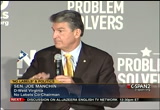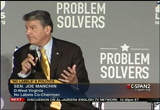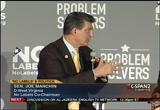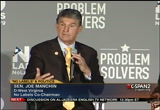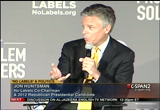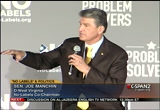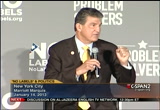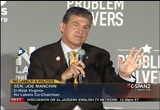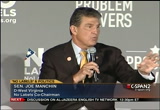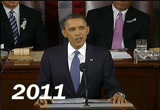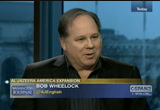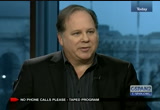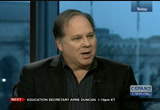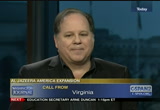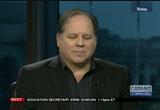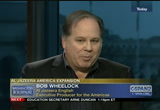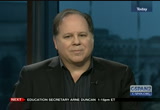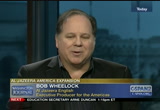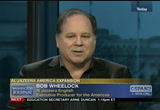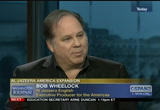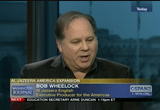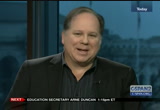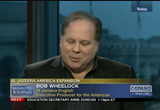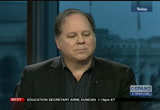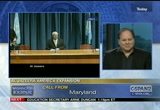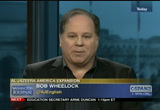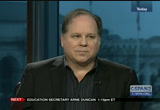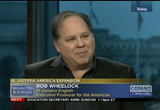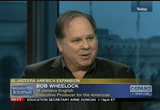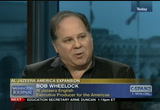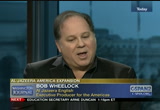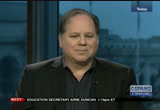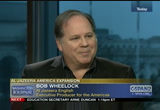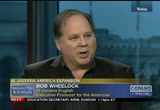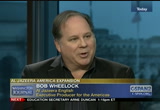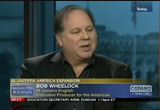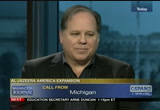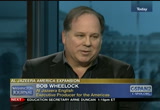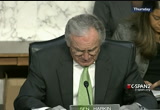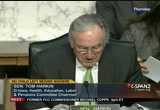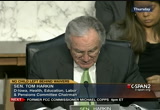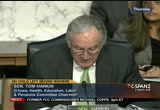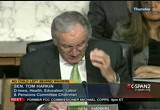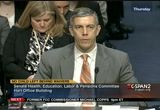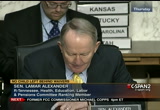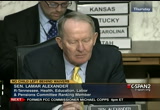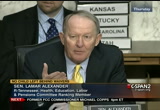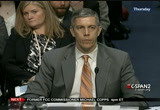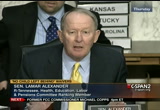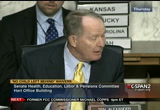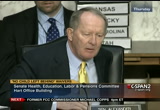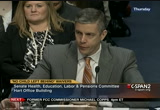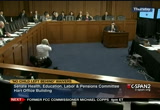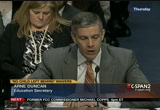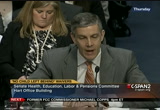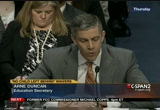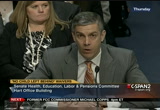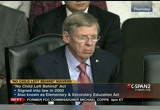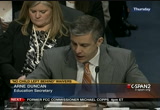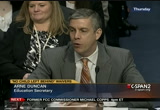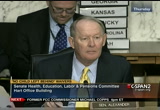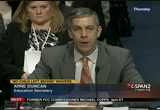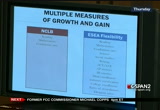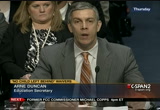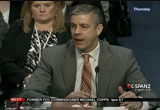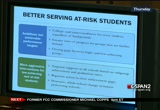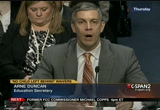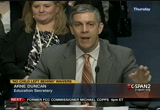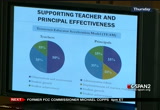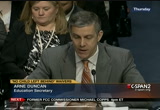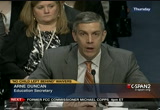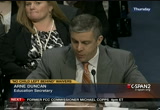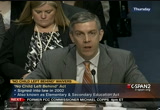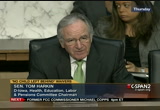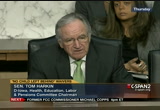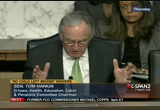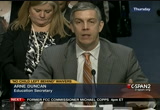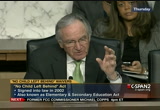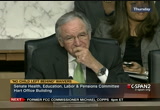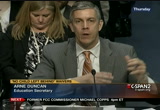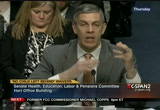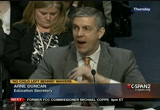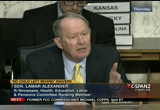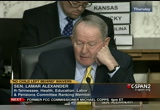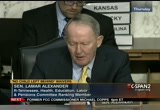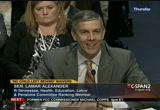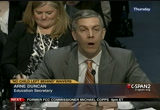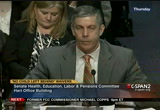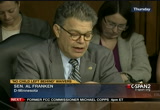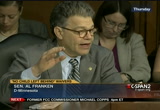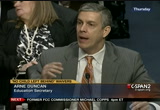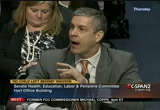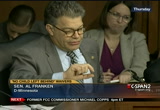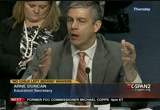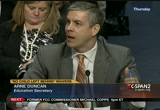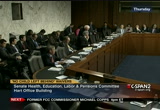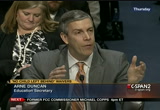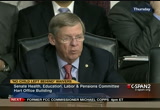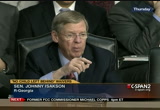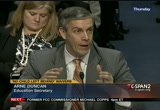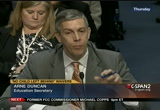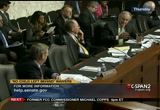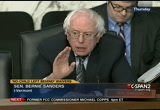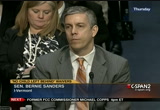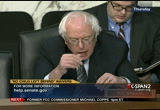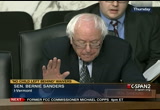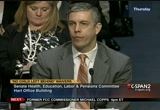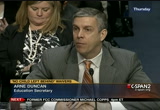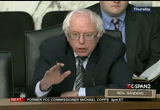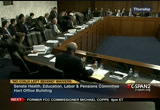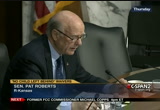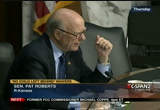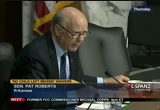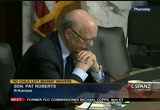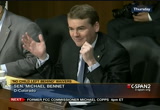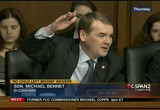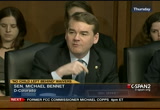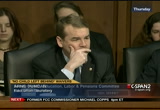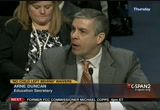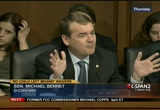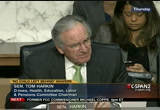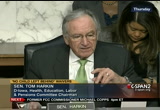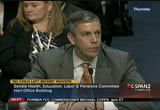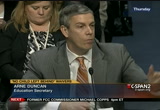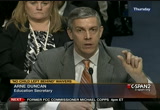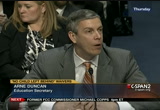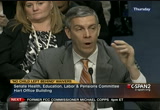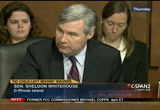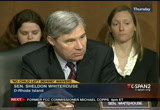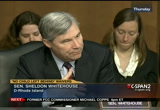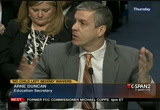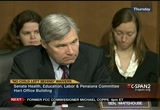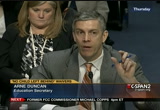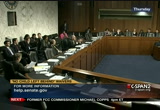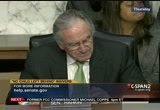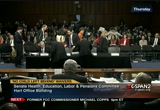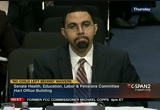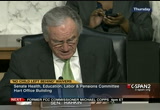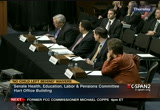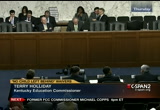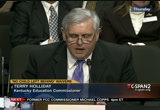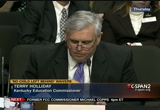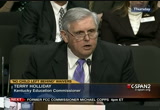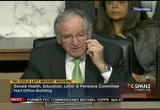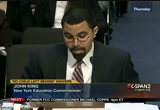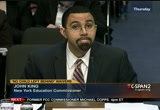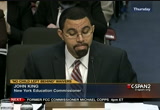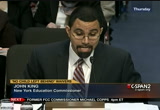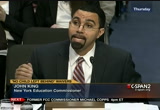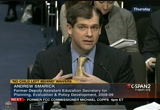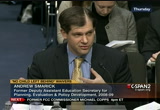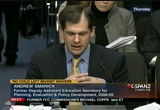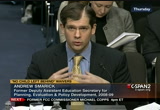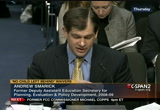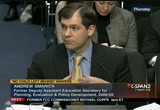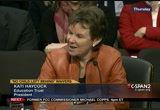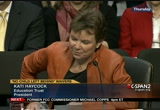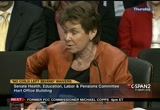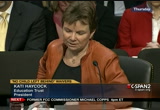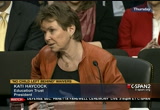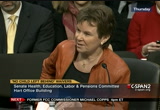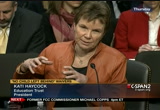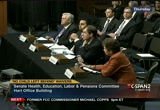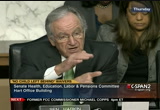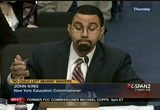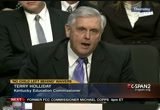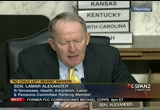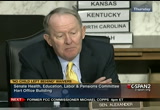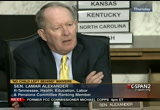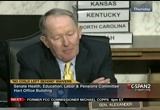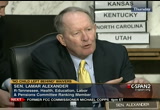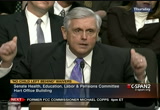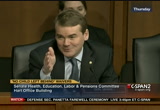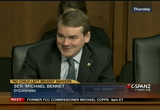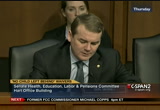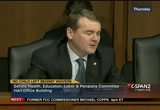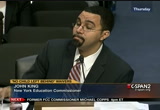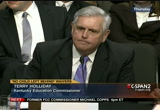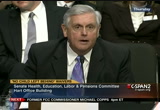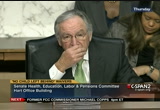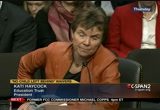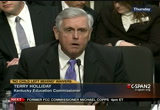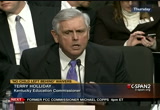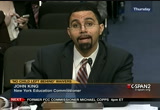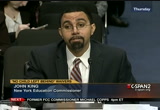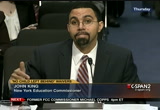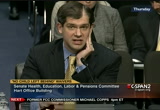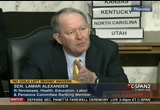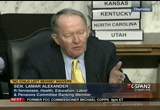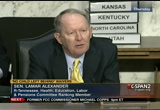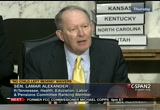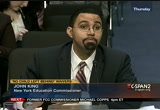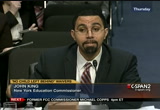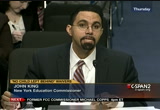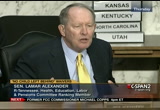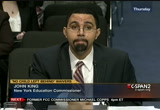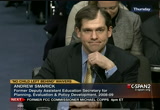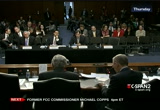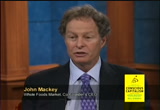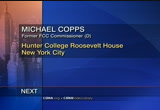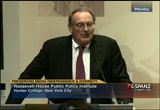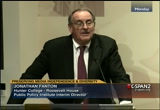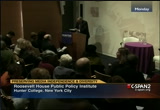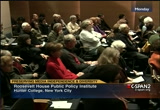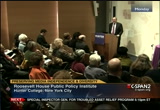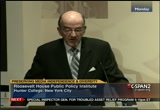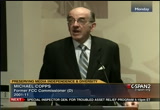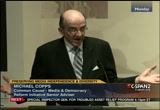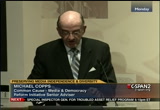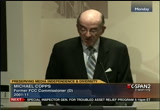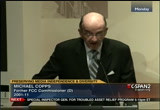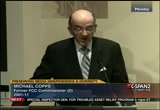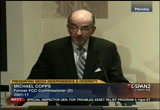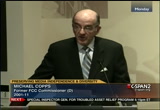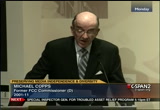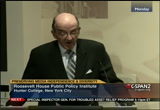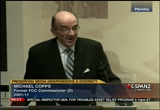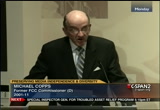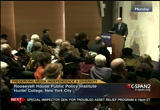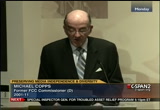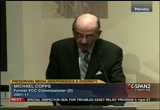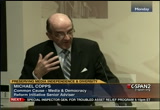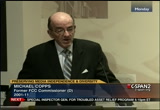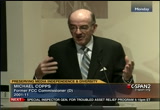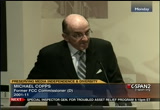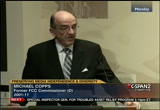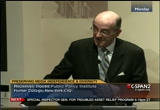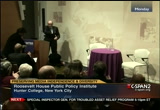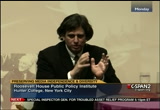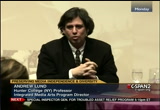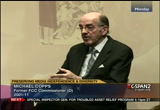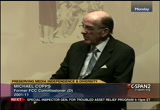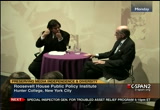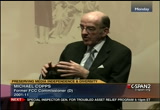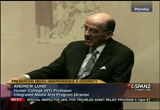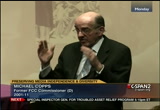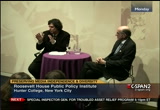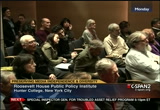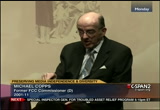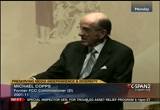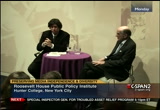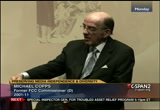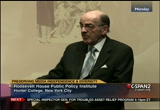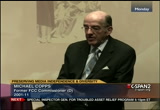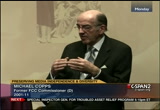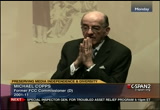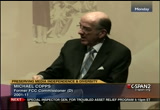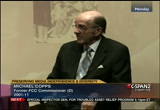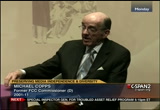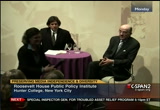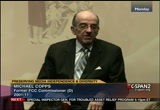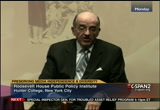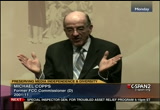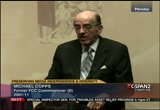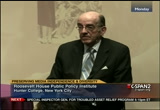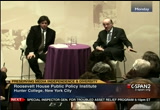tv U.S. Senate CSPAN February 8, 2013 12:00pm-5:00pm EST
12:00 pm
if he would start with this one for us. i love this person is campbell. he or she goes by righttobeheard to read talk about why you've chosen to become a leader -- >> we can't hear you. >> you talked a little bit about why you chosen to become a leader of no labels. what will you do to convince the congress to join in as problem solvers? >> i believe there is as many frustrated people in conagra's as i am pittard i believe the 435 majority. when you hear about people making a deal if you hear about john boehner talking to the
12:01 pm
president or mitch mcconnell talking to the vice president or harry reid, there's a few people at the top trying to make these decisions thinking we should all fall. there's little reach the bottom to find out where we are coming from and it's based on seniority. that hasn't worked well. we haven't been able to fix much with that type of attitude so i know when we reach out and have 25, 30 of us and we are reaching across the aisle malae -- i will give you a perfect example. we had a problem with revenue and people said we don't have a revenue problem, we have a spending problem. we have people on the other side saying we don't spending problem, we have a revenue problem. they are both right and they are both wrong. how do we get people on the other side if a republican says i don't want any more revenue but they said it might not be that it's just i don't like the way that you spend the money and the democrats say okay.
12:02 pm
can we come to an agreement? if we vote to have revenue and also you are asking me as a democrat if we have new revenue can you spend it in majority of it will go towards debt reduction the remainder goes to infrastructure. nothing goes towards growing more government or more programs. can we manage the government better and get our finances back in order? is this something you can go home as a republican and fix? that conversation is not being had. there is enough people like myself starting to talk in these organizations and no label to do that. this is the only one that gives that the new right now to have that dialogue. we have to move this from the bottom-up. [applause] >> how do we move more members of congress into problem solvers? >> one more time? >> count we move more members of congress into the problem solvers group?
12:03 pm
>> once the word gets out that this organization stands for a few overriding elements that nobody can quibble with like putting your country first, not running for the sake of the next generation as opposed to the next election, simple principles that i think are universally respected and understood then i think people will begin to understand what we all in this room understand, and that is problem-solving around this concept is not only good politics in terms of moving the nation forward but it's good politics at the grass-roots level as well because members of congress are terribly concerned about what they hear in town hall meetings. going back to your congressional district you hear about the latest grievance at the grass-roots level and you want to make sure you are prepared or on top of those issues servicing your constituents that there will be a lot of people in this
12:04 pm
country who when told you went back as a member of congress to solve problems and work on behalf of the next generation coming of the next election and put the country first and the time of difficulty for this nation you'd have a problem with your constituents. that is a sure-fire recipe for reelection so members of congress when they see it's good politics, good policy but also good politics i think we are going to be able to take this from 25 members problem solvers to 75 or 80. i don't think there's any question and that is what makes this so exciting because every question that i have had along with yesterday and today is what are you going to do about it? it sounds great but what are you going to do about it? here's what we do about it. the member you get 75 or 80 members willing to meet on a regular basis on problem solving, that's critical mass of that moves things forward.
12:05 pm
>> if i could say one thing on that. if i could add one to that. you are a basic katulis to make this happen. it's the rank-and-file and people working out in all different 50 states that should be going up to the representative whether it be a congressman or congresswoman or senator in asking why are you not involved? you told me all the things in washington. nothing seems to be happening but i don't see that you are a member of labels and it is the only group i know that is not associated guilt by conversation. they will still sit down and talk and not be afraid of getting labeled one way or another. it's no labels. we will talk about the issues and problems of today so if you are giving me good what service why haven't you become a member of baliles? you want to have rights in congress so we will move this movement of hours if you will. that's what is going to happen. that's the brand. we have to be branded as the solution, as the problem solvers and that's up to you to carry
12:06 pm
that message. >> we are going to go out now to the magic microphone over on the far side of the room. >> thank you. >> i am a member of a no labels team here in michigan and if there is any state that is a poster child for hyper partisan gridlock, it would be michigan. my question, and our leadership role back home as citizen leaders, we do everything at the grass-roots level with people problems of everyday with real and immediate problems. oftentimes the barriers that we face are related to them and not believing that the people in washington listened. so as the two of you come as leaders will you be able to come
12:07 pm
and help us in our state if we can convene the forearm and pull together all of our the grassroots families and help put them in households and neighborhoods who want in fact to make this work and who we can invite our leaders a few well so that if they can hear this message, they have a model of how this works from the two of you since you are the face of no labels is that something that will be possible, and one other part to that in the way that the congress is structured right now there doesn't appear to be an infrastructure that even makes it easy to happen at the level that you are. how is the leadership of the party how are they relating to this and what kind of feedback have you gotten? >> so we have two questions, governor and senator, won the
12:08 pm
grassroots organizing taking place in your leadership and one about the leadership of the party, right? >> thank you for being here, for your involvement and the questions. let me say on the grassroots part, democracy was never supposed be easy. the system was built with certain checks and balances. it's given the power to the people and that means that in organizing for have power. means that the grassroots if we get our message out we will be able to move the kneal as they say. so for whatever value which might be chosen a whole lot better value than im i think we expect to be out at the grassroots level and a big part of this let's face it is going to be engaging. [applause] engaging your neighbors and friends and associates. because tell me. in your own conversations -- i've had several of these myself, when you begin to describe no labels and what we
12:09 pm
do it is often met with that sounds great. however you going to do it? you don't have a lot of people that say it a horrible idea. i haven't had that yet. it's fundamentally a good premise and it needs a grassroots bottom-up approach on the organizing side. let me tell you what i learned running for president of the united states, which was an unforgettable experience. [laughter] it didn't go as far as i had hoped, but let me tell you what i learned at the grassroots, i learned how much people in this country care about their future. people turn out to town hall meetings to meet candidates come to hear about ideas without being forced because they care about a better tomorrow. every american wants a better tomorrow for their family. that's just the way we are. we are a caring kind of futuristic people always looking around the bend trying to
12:10 pm
participate stevens could anticipate what lies around the corner but it happens at the grassroots level and through that whole experience, it was -- there might have been some other aspects that didn't work so well that i have some quibbles with, but the grassroots of this country, ladies and gentlemen, are alive and well and open to ideas and open to be organized around compelling thoughts and movements and this is one. we will be out to help any way we can and on the congressional question i'm going to leave it to my good friend, the senator from west virginia. >> thank you. first of all we all, absolutely, john and i and all of the members as you seem we will be out there helping as much as we can. right now since we only work three days a week in congress -- [laughter] we've got a little time. [applause] if no labels is successful and
12:11 pm
we start working five days a week, we will still make time. [applause] with that, also you asked about the leadership. all they do is count numbers. it's all the numbers. bill clinton said it's all about the reference checks. it's all members. right now is such a small, slim majority. the house works on the majority, 50% 18 votes come to hundred 18 votes control. so, when you have on the party lines the public devoting one way and democrats the other come if you get a group in the middle but says that's not good for america or the next generation. it's not who we are as a people, the court doesn't take many, 20, 30, maybe on congress. now let's go over to the senate. and the reason that we take 60, our founding fathers basically wanted the minority to have the same amount of input as the
12:12 pm
majority party and it's true the democracy. the works that way. it hasn't worked that way because we can't get by procedural, get a vote to the floor because we are in such turmoil but if that happens, you have 45 republican, 55 democrats it takes 60. is only takes a swing and gillmor of 15 people one way in the senate to make it happen. you bring that out and i guarantee you the leadership can count numbers and they know when they don't have 60 triet they know when they don't have to 18 and things happen and that's what we are counting on. that's what used to be -- the metal used to control and now it is extreme right and left and it's not about is it good for the country, is it good for my party or your party and if i can blame you, do i get more credit? the blame game is unbelievable and we've got to stop it and i think we can.
12:13 pm
[applause] >> anthony has the microphone. >> paul from connecticut. thanks for leading us. my question is from a strategic standpoint do you see any potential threats out there that could hamper our ability to achieve our goals, anything we should try to stay ahead of as far as just from a strategy standpoint? >> who would like to go first on not one, governor? [laughter] >> the biggest threat this country has i believe it is twofold. we have a fiscal challenge that when you look at the numbers as a percentage of debt to gdp is pretty alarming and frightening. if these young people behind me every decision we make we ought to keep them mind and a freer hand enough to the next generation. that is a little frightening and longer-term destructive unless
12:14 pm
something is done about it and the second is a loss of faith in our form of government. i call it the trust deficit. it's a little bit like the fiscal deficit, the deficit of another kind but equally corrosive when people of a sudden conclude the system doesn't work and they no longer believe in participating and engaging in the system. the system is only as good as those are willing to participate and engage so i think those are the two biggest threats on the horizon. we can read and use the system with a sense of enthusiasm and direction and energy. i have no doubt about that. and it all has to do with the amount of progress we expect out of congress and whether or not we are smart enough to put this problem solving coalition together which can achieve results. then beyond that, if we can enhance the believe devotee of congress through simple things
12:15 pm
like reorienting the schedule so as joe said more time is wasting traveling to and from your district and actually sitting in washington touring the work of the people coming and if we can do simple things like no budget, no pay if you can't create a budget of spending bills by the time certain coming you have to get paid. some simple governing principles you know, if we get it close to the finish line come anywhere near getting done, the american people are going to cheer this on because they know that it's the right thing to do. you know what that is going to do? it is going to stimulate a sense of believe ability in our system and our system needs this desperately. part of what we are trying to do is not only get us are around to a group of problem solvers, but there it is energy or immigration or tax reform, actually get the work of the people done but let's also focus
12:16 pm
on tackling the trust gap and infusing a little bit more believe ability into the system. >> who may be out there trying to stop our work? who may be out there trying to stop the work and what do we do? >> i was going to say this, put yourself in my position. i come in as a brand new freshman from being a governor from the great state of west virginia. i come into the 112, chris which is the least performing in the history of our country. insects have a higher rating than we do. you can imagine my frustration. we are going to change. who is out there shooting at us? the have probably seen a lot of different organizations, to change the world we are going to do this and that and they start taking policy positions and trying to become a party that is in our goal. it's to make this thing work and
12:17 pm
that makes congress work. if congress works, this government will work and this country it will work and we all work. that is what we are trying to get. your movement is basically -- i'm not trying to convince you to be on a certain position on any issue we have. i want to know why we have a difference and i want to have a dialogue with you to see if i can come to the middle. if i am a leader i have to find out how do i give you comfort in order to meet me somewhere he made a final rule that you're basically ingrained and tom brokaw said that 75% of all of our districts, 75% are bulletproof, that means people can be as far right and left as they want and get reelected. we can't change that until the next census or redistricting but we can make a conscientious effort to have a different movement. there are going to be people shooting at us that are saying we don't have a purpose. let me tell you, i have been there for two years. i told you i didn't have the
12:18 pm
caucus where i was able to talk with republicans and democrats. whether we agree or disagree i don't know unless i make an effort to pigeonhole every one of them. for most virginia we never interact with the congress. the first time that i had a chance to do that was in problem solving. we have something already that no one has ever done before. we have a group that is trying to put people together to solve the problems. we are not identifying them. the problem has been well identified. we can't get people talking about it and if you would let them stay in their cocoon they will never change. will be further right and the metal will shrink. >> think where the money comes from. you don't get in your pocket until you are mad about something and someone has pushed you too far or someone hasn't gone far enough is where you get involved. it's too late then. you have to make sure that doesn't happen. we have a crisis, we really do.
12:19 pm
you don't release of the crisis we have wasted many opportunities ahead of us i can assure you. and we can fix this thing. i am just not going to have the naysayers because i am sitting on the inside. i don't have another opportunity. no one has come to me and said joe, come over tonight at 5:30 and meet with some converts people. they might agree and they might disagree but at least you can talk to them and count me in. bring them over to the senate and count us in. that's what we have and no labels has today. >> thank you, senator. we've time to take questions from one from outside of the building. can you find a good question for us over on your side and then we will be wrapping up in a minute. from facebook, gary asks what can the average american do to help the gridlock on both of your points of view? the average american to break gridlock. >> the average american has to get involved. the average american voting today to get out and participate
12:20 pm
or go through the town hall meeting or speak up or go to the congressman or senator or the reach out and get involved in the process. everybody doesn't have to put their name on the ballot, but you have a responsibility to be involved. it doesn't mean that it is someone else's responsibility and that is the problem that we have. the metal was working so hard to survive at the base real world that they do not have time to be involved. so i am asking all of them, take time. ask your congressperson what they've done. if they agree or don't agree and if they vote for comprehensive. why are you opposed to fixing the problems that we have? why do you want to keep kicking the can down and creating artificial crisis? why do we not have an energy plan? can you imagine the most prosperous nation on earth doesn't have an energy policy that basically uses of our resources for the benefit of our people? why are we allowing that to happen? with that, i would ask them to
12:21 pm
just be involved and push and vote and maybe they will get mad enough and run for something. i don't know. >> i think our greatest enemy is today in the discos and to protest a bidding directly in the politics, our greatest entities are apathy, a cynicism, largely. the fact that particularly the younger generation don't see a reason to purchase of pagen get engaged without remembering that a free voice and a free vote and every person in this democracy of ours counts. part of what we need to do is energizing stimulate people let the grassroots level to begin once again in the government that can function properly. and then we have to prove through the group of problems offers that we can actually get some results on some of the most fundamental issues of the day. that will be great but we are a grassroots nation and never let
12:22 pm
that be lost on you. the amount of people at the grass-roots level as when to be our secret weapon under no labels. >> thank you. let's wrap up in the next question. >> i am a sophomore at the university of wisconsin madison. i started the bipartisan issues group that republicans and democrats fight comprehensive to the issues that we need to solve. through this group i got a deal with the college democrats but those of us thought are not involved in the politics and education or finance or any other topic and a lot of people but are not in the politics don't know what to do and they believe they see the problems in front of us and they understand and comprehend how serious they are and they want to do something that they either do not know how to or they are
12:23 pm
intimidated. but from my experience they are ready to believe again and they can hope again and as our national leader continuance buyer and hope my generation the people that are older than me so once again stand out and fight for what they believe. >> it's how you teach an old dog new tricks. >> most of us are in our environment how we were raised, and we learn from them. i have said there's five promises every adult should make. the first is a child should have a loving and caring adults in their life and the second is they should have a healthy start to read the child should have an education. the child should have a safe place. the second one is a promise you cannot teach. they should grow to be loving and caring adult and give something back. the usually emulate that who they were raised by and have their fellow suit. in the political process it is
12:24 pm
hard for anyone of you looking today to try to find a hero that says i'm willing to make a vote. hopefully we will give political leaders and policy makers the courage to say i am willing to sit down and talk. i'm not worried about guilt by conversation. even though i might disagree or think that you are not right for the left field i want to hear what you are coming from. maybe we can find some commonality. i am going to make a tough vote and if someone says you are going to make the vote, guess what, you will probably get defeated because you won't have time to go home and defend yourself and the press will basically report that in such a different manner than you were trying to fix but it will solve the problems for the next generation. think about that. that is by far the smallest sacrifice i can pay by having
12:25 pm
the privilege of living in this great country. that is the smallest sacrifice i can pay. [applause] so, i know what you're dealing with right now. the democratic party, the republican party, and george university and you are trying to bring a bipartisan under together that may not be the appropriate thing to be doing right now. i can assure you if you can start getting those members either democrat and republican party to begin or allow you to come and speak to them and find out where your differences may be you'll start developing some leaders that are going to be not afraid to step forward and you are going to have organizations on kendal labels that will have your back. [applause] >> let me say in short we will be making a huge mistake if we did it even more aggressively organized on college campuses are not this country. [applause]
12:26 pm
because there is great energy and vitality in the use of this country. i get out to the college campuses on a pretty regular basis and by and large, i feel the energy and the intelligence to the body feel the optimism that emanates from the younger generation today want to reach the hope, they want a reason to believe and in many cases they are becoming an affiliated. they are feeling disenfranchised. we have a perfect opportunity to help organize about the new labels. you have republicans and democrats as we are up here and others. whether libertarian or vegetarian. but everybody is going to want to find their country succeed and they are going to want to find solutions at the end of the day. and i think that no labels will find the power in america today to get let's go for it. [applause]
12:27 pm
>> we know the leaders do not lead by themselves to read the lead with their families that commit themselves to a life of public service so let's get a round of applause for the families who are here today supporting. [applause] >> we are lucky to have the two leaders with us who do not look at us and say follow me, but instead say i'm getting in it with you. thank you very much. [applause] ♪ ♪
12:28 pm
12:29 pm
america is much improved and there is good reason to believe that it will continue. [applause] >> my duty tonight is to report on the state of the union, not the state of our government, but half hour american community to be and to set forth our responsibilities in the words of our founders to form a more perfect union. the state of the union is strong. >> as we gather tonight at the nation is at war. our economy is in recession and the civilized world facesf our tightedented dangers. yet the state of the union has never been stronger. our destiny remains our choice. and tonight, more than two centuries later, it's because of
12:30 pm
our people that our future is hopeful, our journey goes forward a >> guest: we believe it is 4 1/2 million people who can see us on various cable networks, in some of the larger cities and then some smaller independent operators in smaller cities. a good part of the traffic has been people who stream it online. that is pretty dedicated following. in fact, with the very large
12:31 pm
online content it was 40% of that comes from the united states. >> host: so that is the appetite? >> guest: there is appetite clearly. online streamers. >>ing are fresh should have content to have people cross over. >> al-jazeera purchased current tv in december last year. just month 1/2 ago. how about expanding the american audience. who will you reach right now? >> potentially estimated 50 million viewers. if you talk going 4 1/2 million homes to 50 million homes, obviously a great leap forrd -- forward. one of the things we fought for years was distribution in the meshes. this opens some eyeballs to us and we hope we'll give people a chance to see our
12:32 pm
coverage, to sample it from those that haven't seen it and provide another platform for the core audience that we already have. >> here are some facts about al-jazeera english channel. it is a 24 hour global news network and it is carried in places like new york city, washington, d.c. and some other select areas. vermont. ohio. and some are carried on link it. v. >> yes. >> they carry a couple items you do. 95 million visits to the website in 2011. as bob wheel lock says in the united states. why expand the reach? what is the mission of reaching more americans? >> the mission is, it is part of a global expansion anyway. we have a turkish channel. we have a balkan channel there is plans for a swahili channel. there are plans for additional channels after this. i think it was determined years ago, and i wasn't there at the time.
12:33 pm
i'm not going to --, there was an absence of coverage of large segments of the population of the world. it was also felt that a large segment of that population was underserved or did not trust their broadcasters in the countries they were. we do have, we do have research that shows that in astonishingly high number of viewers in africa get their news from al-jazeera because they don't trust their state-run newscast as much. so it is an alternative. we have 70 bureaus around the world of various sizes. but it gives us a breadth of coverage to report in places where other people aren't. just the other day was fascinating. we're in mali with all that is going on there. in mali, nigeria were playing a football match, a soccer match. i looked up and we had back-to-back reports from mali and nigeria. who else has that? that is astonishing.
12:34 pm
>> bob wheelock is executive producer for the americas al-jazeera english and senior member of the team helping to establish the new al-jazeera channel which is launch the, july 2013? >> yes, we hope so. it is an ambitious launch. we made a lot of good progress but there is a lot to do. >> if you like to join the conversation. republicans call 202-585-3881. democrats, 202-5853880. end causers 2812,-505. 38982. outside the united states. 202-585. -3083. how will al-jazeera america differ from al-jazeera arabic? >> al-jazeera america will be as base line we're looking domestic content and 40% international. any given day depending on the news flow we'll not stick to that as a hard and fast thing. that is the overall intent. what it allows us the
12:35 pm
expansion also gives us more resources in the united states. we have five bureaus in the united states right now. four in latin america. we're going to increase that to 11 overall in the united states and one in toronto where we currently have one and a total of eight in latin america is the plan. obviously it allow us more the coverage. we're trying to place the bureaus strategically. one of the big frustrations for me is the some of the stories we can't do in america because the resources are so stretched thin. we're looking to cover more stories of the people of america, their day-to-day lives, the things they're going through and in many cases the solutions they have come up with to try to make their lives better and to try to overcome some of the obstacles that they face every day be it withheld health care, the economy, education. americans are incredibly resourceful people and i think it is probably the best melting pot of stories we could ever hope to fish
12:36 pm
from. >> let's watch an excerpt of al-jazeera english coverage of the boy scouts of america debate right now whether or not members and leaders, openly gay members and leaders should be allowed. here is how al-jazeera english covered that. >> being a boy scout is a tradition that has been passed down for generations here in the united states but policies here in the u.s. contrast sharply to international counterparts. for example, homosexuals are not restricted from membership in canada or even most european associations. even the u.s. girl scouts have a different policy, accepting gay and transgender members into their associations. the boy scouts of america have almost three million members and 70% of the troops are sponsored by church groups, who oppose homosexuality. in 2000 the u.s. supreme court ruled the group has a constitutional right to refuse gay members. it's a policy many parents want upheld. >> it is not hate. it is not bigotry.
12:37 pm
it is choice how to raise my children in what i perceive to be my christian values. >> on sunday president obama weighed in urging the group to open its membership to everyone. he agrees. >> the boy scouts are unwilling to lift the ban they simply won't be relevant to a generation that decided to embrace lbgt brothers sisters, coworkers neighbors, friends. >> for now the ban remains in place. scout leaders say they need more time to consider and consult before deciding to whether to everyturn a century old policy. al-jazeera washington. >> that is an except from al-jazeera english, one. news programs that airs on that channel. bob wheelock, what is the lens or voice that your journalists approach their stories with? >> it is not any different from any other broadcaster i don't think. you look for the truth. you look to tell the story for the people and to give them a voice.
12:38 pm
we will go out and try to find central characters often, to drive a story, to try to give it, you know, something that you can invest in as a viewer. but, you know, essentially on a story like that it is a news story of the day. it is fairly cut and dried. we make a great effort getting all voices in. and then try to leave the viewer, here is your information, this is what people are saying, you decide. it is not for us to tell people how they should feel either way. we try to present them and let them have some information from which they can make a intelligent decision how they feel about is story like that. >> let's go to the phones. michael in centerville, virginia. >> caller: good morning. mr. wheelock. you said you lens you approach your coverage with is the search for the truth. i have afraid to say my
12:39 pm
experience here is a little bit different. i am an american from an egyptian origin and i was, in tune to listen to coverage of the egyptian revolution two years ago. and my experience was very discouraging to say the least. your coverage of the events was inaccurate. you exaggerated the numbers of people on the streets when the events were actually to your liking and you played down the numbers of the youth on the streets when the coverage of the events was not very much to your liking. i do want to ask you if you have any affiliation with the government of qatar? because, as far as i remember, the egyptian news who actually -- youth, who led the revolution did not like the coverage of it and kicked your journalists out of the streets where you attempted to cover the event the military supreme us council who led egypt for two years did not like you
12:40 pm
and almost kicked you out of the country. so do you really think your extension here into the u.s. would be different? >> michael, where did you get your facts if you found that information that you were getting was contradict tri where al-jazeera was reporting? where were you getting your facts? >> i was in complete contact with my friends on the streets of egypt during the revolution. we had other channels covering the -- [inaudible] >> you're starting to break up on us. we'll go to bob wheelock with response. >> let me ask you, as far as the relationship with the government of qatar, the, royal family, the government of qatar owns the channel. as far as any relationship i have, i have never met anyone from the government of qatar. never been told i need to do a story a certain way. can't do a story. i've had no editorial interference at all from anyone. in regards to our coverage, i'll let it speak for itself. it won numerous awards
12:41 pm
around the world. many, many other networks took our coverage and broadcast it. there were millions of people on the streets. there is millions of points of view. you say we were kicked out of the country, forced to leave the country by the government. i would say that says maybe they didn't like our coverage because they felt we were providing too much coverage of the people, of the youth, of the revolution. you know, there is a myth that we have this great relationship with every middle eastern government when in fact quite a few of them don't care for us because we do seek and talk to the truth. we do talk to people in the streets. we did hear from protesters. we put people in great harm to cover that and we, look, we lost a cameraman a week ago in syria who was killed on duty. we, we do seek the truth. i think most of the time we get it right but as i said, there is a million people on the street. you will get quite a few
12:42 pm
diverse opinions and i appreciate yours. >> bob wheelock is with al-jazeera english. al-jazeera news media for about a year now. prior to that he was a 25 year veteran of abc news where positions called being d.c.-based senior producer for shows like weekend news and this week with david brinkley. he also worked at nbc news a little while ago. 1989 to 1991. senior producer for the today show and nbc's london bureau chief. republican caller from alexandria virginia. >> al-jazeera al-jazeera journfallists in 2005 four and 2005 basically identified directly aiding and abetting of u.s. forces on the ground and directly contributed to by spotting and targeting american sources for the enemy directly leading to the
12:43 pm
death of american troops in iraq. and i think that it is something that american or listeners of this show should be very much aware of when they. participating in the al-jazeera. i read your website consistently. i think the news is decent but the editorial portions are so strongly anti-american, and, all of these articles they are talking about the downfall of america, and the strength of the vis-a-vis america and how, and i give you a perfect example. last week when president obama announced an increase in aiding and humanitarian aid to syrian civilians and the ref few camps in southern turkey, al-jazeera ran the article how america not giving weapons to the free syrian army was actually indirectly assisting salafists and extremists al qaeda type linked groups that would be
12:44 pm
fighting there, leading indirectly to extremist result. maybe you could comment on how, it mice my opinion that you all are a voice for the k katari government. it is not a free or independent news channel. it strongly anti-american and leads to pretty anti-american middle east. al-jazeera arabic is horrible. i have very good friends who speak arabic, would tell you very clearly the anti-american debate that goes on there and the support for any type of idea that is anti-american is, is just doesn't stop. can you please comment on that. >> before we let you go and turn to bob wheelock. you said you go to the webb site for news stories. do you find those to be fair? >> caller: they do provide stuff on africa and east asia and bangladesh. these are not things you would hear about in your normal, in your normal news channels that are here in the u.s. so the stuff that
12:45 pm
is not directly to the u.s., i mean i will look at it. i look at it with a big grain of salt. i was present when, in afghanistan when al-jazeera was on board and they were covering one of the things we were doing there, as i mean, not individuals doing it. i think they were doing their best but when you get to the editorials, you have some unbelievably radical opinion columnists and radical editorials that are leading to the coverage of your news, and the anti-americanism, i think it is harmful. and i would question you, bob and i would question what is your motivations and your your personal loyalties lie? >> let's give him a chance to respond. >> i will respond to the three points, last one first. i am an american. i was born here in washington, d.c. in bolling field air force base. my father was military. so i have no doubts about about my respect for this country and for what it
12:46 pm
stands for. on your assertion, that al-jazeera crews were helping to spot and harm americans, that allegation has been made. it has never been substantiated. did a call-in show a couple weeks ago. the gentleman who was in iraq at the time who was assigned to handling the media, he brought that up. when asked by me and another panelists not from al-jazeera if he had ever actually seen anything like that, he admitted no, he just heard it. there is a lot of things that have been said that took place on al-jazeera, that never have been proven to be true. the al-jazeera office in iraq was bombed, you know. maybe it was a coincidence, i don't know. the editorials are that, they're editorials. i really can't vouch for them, attest for them. we produce news content from the united states for the channel. i'm proud of that.
12:47 pm
we consider, you know, it is not pro-or anti-. what we try to do is be editorially correct, not politically correct. sometimes people are not going to agree with what you say or do. i think it is important to move that needle. after the at end of the day there is no reaction, i think you have probably failed to stimulate any sort of, any thinking about these issues, to start any discussion. but i, i take a little umbrage at you questioning my, my role and my patriotism and, again, these charges, if you can cite specifics and a time and a date, i'll try to go back and find it but these are some of the various charges i've seen, mostly by people who never watched channel. actually. >> here is a story from the guardian. al-jazeera advertises 100 job posts in new york and washington. middle eastern broadcaster begins a hiring process as it prepares for the launch
12:48 pm
of a u.s. news channel. it talks about the jobs you're hiring for. the likely to be called al-jazeera america follows mid dill eastern broadcast fer to $500 million to buy al gore's cable tv network, current tv. al-jazeera plans to double current tv's headcount. we talked about some of number and employees you hope to bring on staff. who will be faces and names and voices of al-jazeera america? >> that we don't know. the search is beginning. i will say this. there were over 11,000 resume's the other day. so clearly there's interest in working for the channel. we hope to find journalists who are respected and known for their journalism. we would like them to have some identity and recognition with american viewers. that will obviously help. but we want them to be known again for the right reasons. for their good journalism. their credibility, their integrity, not so much for their personality or, you know their celebrity. >> here are some facts about
12:49 pm
al-jazeera media network. it launched back in 1996. the english channel came online a decade later. the purchase of current tv happened the tail end of last year and in july of this year the planned launch of al-jazeera america. some more details about the network. it reaches over 260 million homes in over 130 countries and the staff numbers include over 400 journalists and 70 bureaus around the world. this guy writes in on twitter says it is sad most american news outlets all but eliminated their foreign correspondents on the ground. it is either bbc and al-jazeera now. are you bucking a trend? >> yeah we are and trends against conventional wisdom. i worked at american networks as you point out almost 30 years. i was a lond door bureau chief and i worked in london again for abc also. they did cut back. covering international news is very expensive. and there are agencies will provide you the picture but not the context, not the
12:50 pm
actual reporting and you either take that picture and voice it over in london so it feels international or new york or washington wherever you have people. we have boots on the ground. we have people, we have people in mali. we have people in nigeria. we have people in bangladesh one of the viewers pointed out. it is not everyone's cup of tea. i don't believe every american will wake up and say, what is happening in mali today? we know there are a lot of people who are not happen with what they're getting from the american television news networks and do have a broader interest. again the website traffic indicates that. the e-mail traffic we get, the twitter traffic. the response we get, even the last viewer who was critical admitted he does get some news on al-jazeera that he doesn't get from other places. that is our audience. >> brooklyn, new york, john is up next. democrat's line. hi, john? >> caller: good morning, mr. wheelock. i'm looking forward to
12:51 pm
al-jazeera english. yeah, this is what i'm expecting from, from al-jazeera english. perhaps once in a while it will be nice if you talk about the 9/11 truth, like, why 1700 architects and engineers signed a petition calling for a new investigation. and can you imagine if the -- would have been a muslim activist? i think there would be more questions. our government openly willing to support al qaeda and syria why won't they do the same with 9/11? if you have a case of the dancing israelis, the -- [inaudible] i mean. >> i will leave it there and go to a comment on twitter. >> leave it right there. >> sale of current tv, al gore's network. how can you possibly have a segment on al-jazeera and not talk about al gore's sale to them. tell us about the sale and what that meant for you? >> means nothing for me personally.
12:52 pm
>> al-jazeera. the network. >> for the network again, it is an opportunity for us. like i said we were trying several different ways to get, to get exposure, and distribution in the united states. al gore, you know, launched this channel. it was an admirable enterprise. it wasn't doing well ratingswise and it became available. either we approached them or they approached us. i honestly don't know. i wasn't involved in that and it became available. for us, wow, here is 40 to 50 million homes that we can now tap into but we do have to come up with a whole new channel. so it's a lot of work. it's a lot of risk. a lot of people make a great deal out of the cost that was paid for the purchase of the channel. i don't have the numbers totally correct but i believe with fox, same sort of false starts and started to get distribution started i think they paid a billion dollars to get their drib shun. it is a big stakes money game.
12:53 pm
we, we wanted to have distribution in the united states. we felt there is an audience. so the investment was made. >> ann is our next caller in oregon, republicans line. hi, luann. >> caller:. >> caller: thanks for taking my call. i watched it on link it. v. i think you're slant eyed against israel and jewish people. i'm concerned about the stuff going on in our country from the muslim community. i think your outreach will be toward the must lime community. i am worried about cair. they're very much involved in oregon. i'm surprised to see you're here in america because we would not be allowed to do what you're doing in a muslim community or another country. i'm very concerned what i see. i know you probably have your accolades from obama because i feel he is backing more of the muslim community than he is the american people.
12:54 pm
>> luann, let's go to bob wheelock and talk about her concerns or criticisms about an anti-jewish sentiment. >> again, in our reporting, in the cop tent that we provide, there's none of that. our reporters are americans. we have canadians. we have one or two folks from the united kingdom. we strive here in america to provide fair, objective coverage. and i think we do a really good job of it. i think if you watch what is right now al-jazeera english, and you watch the content that is coming from the united states, i think you would agree. i will disagree that in muslim countries you can't see an american proxy and international is on. bbc is on. other international entities are on in muslim countries. it is not censored. it is not filtered. there may have been a time years ago where that was the case but it is certainly not the case now.
12:55 pm
again, i have never been told, that i can't do a story that i have to shape a story a certain way, that i have to use terminology or phrasing that we're not comfortable with. on every day, and any day there is editorial questions over how a story should play and how high up it should play. that is in every newsroom, every paper, magazine, television network in the country. >> oakland, maryland. glenda, democrats line the welcome. >> caller: hi, thanks for taking my call. i became a current listener, viewer about a year ago and i really gotten into it. i'm concerned that now that you have brought the channel what will happen to my bill press in the morning and stephanie and john vogel sang. i come to appreciate their point of view. i enjoy it. i'm hoping there is enough slots instead of all the -- in the evening and afternoon
12:56 pm
that you can put new programing which will, you know, cover the news that keeps some of the commentary. what do you have, you know, what is your comment or have you decided this yet? >> we're working out the 24 hour grid. it is huge challenge for obvious reasons. programing what is possible. short time frame what we can do. facilities that kind of thing. regarding folks at. i met with current staff. some of the colleagues on the west coast. they have terrific people. we hope to integrate many as possible and use them, in severe weather center 9 and, i must say the response has been overwhelming from them about wanting to join, and, believing in what the channel is meant to be. so hopefully, who knows. you may see some, you may see some familiarity and you may not lose everything from current tv. >> as we mentioned bob wheelock is executive producer for the americas at
12:57 pm
severe weather center 9 english. he is part of the senior team, launch this summer. 25 year veteran of "abc news." also spent time at senior producer at nbc. his work won four emmies. two duponts peabody awards. he went to college right here, george washington university. john, western pennsylvania, independent line. >> caller: how are you doing. bob, i'm not surprised you got 10,000 new applicants. i think you guys will be a breath of fresh air on american television. got familiar programing and i hope you even out the bias from channels like msnbc and fox. >> john, have you watched al-jazeera english? >> yeah, i watch al-jazeera english all the time on youtube actually. watch it pretty much every night. i think they do some really quality programs, inside syria, things of that
12:58 pm
nature. i think it could be a different perspective on the middle east, which we don't really find in america. at least not readily. >> part, look, part of what we want to do with al-jazeera america, is to provide same sort of prism and a look at the united states. we have a show he mentioned inside syria. we have show, inside story america. we recently just many can the mr. ed three-part gun special, not a terribly original idea in the current climate right now. but the mandate was, that the first show has to be, speaking to and hearing from people who feel it is their right to own guns and let's hear from them and let them explain it why. i told the staff we don't do the series if we can't start with that we say we're the voice of the voiceless. i personally think that gun owners, you know, there is often too many people speaking on their behalf saying what it is they should think or how can they think this way. so we wanted to hear from
12:59 pm
them. we got into a gun show. we got into a gun store. these are pretty easy with camera crews and a little less easy when you're al-jazeera i might add. the folks welcomed us in. the feedback was tremendous and i'm really proud of the job the staff did because the first show in particular was all about those people in this country, intelligently describing why they feel they should or need to own firearms. not something i've heard on a lot of other channels. i think that's what we need to do. again, i use the phrase, editorially correct, not politically correct. i'm not sure not everybody liked hearing from people who think they should have guns, particularly not with all the things that have happened in this country but it's a voice and this is a country where the voices are supposed to be heard. that's what this channel is supposed to be about and that's what we hope to accomplish. >> dog writes on twitter, and asks, what does al-jazeera mean in arabic or is it just a name? >> it absolutely the little
1:00 pm
1:01 pm
you continue to press the story. all the others show on the anniversary of katrina and then they are gone again but we have a commitment not just covering the story the one time but staying on that. we've done it in haiti and the orioles built and we intend to do it now with increased sources across america. >> host: how much access to your journalists have now and will they have s al jazeera launches in white house and the congress and in washington, d.c.? >> guest: we have access, you know, people have a passage to get in, not enough if i can make a plea. we tend to not cover congress on a daily basis with a white house daily basis. we try to cover it when the issue that we think is important enough. obviously now with the american journal was focused on the content will increase that. we do like to be the outside looking in a little bit and
1:02 pm
question it as a longtime washington journalist i know that there is a tendency to, you know, become a part of to you cover. so we are having a little bit outside but certainly i think the programming will demand more in a comprehensive coverage from washington, d.c.. >> host: annapolis maryland. mike, republican line. >> caller: i appreciate al jazeera coming to america myself i've heard that eldora has made a very big step in what is considered an oil issue and a media issue based on his philosophy is. i've noticed since the 80's when ronald reagan released the sec rules and the television news emerged basically into the five you see today. and i think we need to have a
1:03 pm
clear understanding and brian williams said the station is owned by g. e. before a story but people understand why you think that and they do have an agenda based on their ownership. maybe it's not as independent as it has been. >> i would agree. i worked at nbc. i worked at adc when disney took over. again, the influence was never as harsh or severe as anyone on the outside what sort of assume. there are very few independent news organizations. some are tied to the corporate ownership and others with a government-run funding and tax payers.
1:04 pm
bbc is one. it doesn't mean you don't do good journalism. we still hire people. we have 11,000 people or so applying for jobs. these aren't people that we know of in the job description know where does it say you must have an agenda to be anti-american or israeli or anything like that. these are people that want to work and cover and tell stories in a different way in america. we think there's an opening for that as a market research has chosen it. our challenges we to be to try to get those viewers and again, to try to bring them into our tent. most of the complaints come from people who've never watched the channel. >> host: one of the calls earlier talked about the relationship in the government. what is the long-term economic goals or the model of this? is there a plan to be
1:05 pm
commercially viable, self-sufficient? >> to broadcast the cable distributors we have to run commercials. we run a very, very few on this channel. most of them are for various airlines that are middle east related. as producers you welcome it occasionally and figure out where you are going next. we probably are one of the few that have tried to negotiate down the commercial minutes we have to run. it's not something we've done before. we are not dependent on the revenue from the commercials. any money that is made will going to the coverage. one thing about al jazeera is it spends its money on coverage and again, being able to have them around the world and stop those and provide the cost of the trouble to the cover stories and places and people, other people
1:06 pm
are -- the commercial time we have to work it out in our programming and particularly it is a little bit of a challenge with a lot of our documentary programming. we will have to admit some of these things and try to make it seem less with some commercial inserts. for the first time because the relationship with the cable distributors, we need to make some expectations. al jazeera has had the luxury of not caring about their ratings or the revenue. it's almost like programming for yourself sometimes and i like that. the other would be the bar that we need to reach for the cable distributors. we think we will be allowed to do that and again if we get one or two shows going really well that people say what else do they have, then we build the audience. >> host: david in grand rapids michigan, a democrat. welcome.
1:07 pm
>> caller: hi, i just wish to make a comment. i would like to tell the americans out there don't be afraid of getting more news. for example, a few weeks ago -- i kind of watch on my local news and then as you watch nbc and al jazeera on the public access tv station, and for an example, like those three women that were murdered in france by the extremist site, they didn't talk about that for a couple of days on a regular news. and to me i was -- it was like an important story worldwide to let us know there's people out there that are trying to stop people from doing the right thing. and with al jazeera i get that story coming and i didn't get it from anywhere else.
1:08 pm
so we feel we really need to look at al jazeera as another piece of the puzzles we get the full story of how the world works. and also, i would like to say it's kind of ironic that al gore made money off of selling the oil station. i would like to make that comment. thank you. >> guest: at nicu said well, don't your the news for information. that is what we operate on. and we do, you know, you cited i think a very good example of coverage that again, might not be popular to some in the middle east, but it's a story that we did and you have to do. it's an event that took place and you need to get it in context and bares interest in these stories. >> host: independent line, hello, tony. >> caller: the previous caller got my ideas already down but anyway, i would like to say
1:09 pm
you've done a very good job of presenting the program. i don't have it right now, but i am not happy with the mainstream news programs. i watched party america and spanish and enjoy the international coverage and that is what i really want to see and i'm going to be getting on my cable company to see what i've got to do. but you've done a very good job dispelling a very good program. >> host: he or she looks forward to the system was went but wants to know if you anticipate problems with cable distributors command here is a story from "the new york times" media from last month. time warner cable said they will keep an open mind on reinstating al jazeera. the cable company said it would drop current tv right after it acquired by al jazeera. can you answer the questions?
1:10 pm
>> guest: i am not a financial guy. time warner had intentions to drop current tv because of its low ratings. what they are going to replace it with, i don't know. something they don't know yet that is nothing to see yet but they've watched al jazeera coverage and quite honestly i've lived in channel 92 and you can see so it is on as we speak. ultimately i hope they will carry it. it is an important carrier that presents a wide variety of news and spectrum for its people and we would like to be part of that and we don't think that there is any reason why we shouldn't be. >> host: executive producer for america and is part of the team helping establish the new al jazeera america channel which is expected to launch this summer. thanks for coming in.
1:11 pm
1:12 pm
in fact what actually did happen is a dark history. we had a very few records about what actually occurred on the night the plan got carried out in this very church. we know there is a plan that had been set up a head of congress. the members across the way. he set it up before april 175 but we don't know is who helped him carry out the plan. >> on american artifacts sunday and part of american history tv on c-span3. >> the education commissioner from kentucky and new york agree the sequestration hits it will deepen impact their schools, teachers and students. their analysis came during testimony on the note child left behind wall and the
1:13 pm
administration's waiver process before the senate health education and labor and pension committee yesterday. under the states can apply to opt out on some of the educational all and requirements. to date more than 30 states have been approved for the weavers. education secretary arne duncan testified first. this is about two hours and 45 minutes. >> the senate committee on health education and labor pensions will please come to order. i welcome everyone to the first education hearing of the new congress to read today's hearing will focus on no child left behind flexibility waivers to the state. nearly half a century ago, the united states congress passed the landmark elementary secondary education act of 1965 in the 88th congress. it's one of the great accomplishments of that congress, and i think it bares repeating what the aim was to address the needs of the
1:14 pm
honorable students companies that were not being met by the state. it is designed to provide schools and communities additional resources. the second retargeted to help lift children out of poverty by ensuring equal access to quality education for all. the federal government stepped in because many states could not or would not provide for their most vulnerable children. since being signed into law in 1965, the elementary and secondary education act has been ray authorized seven times. each reauthorization is sought to enhance the effectiveness while staying true to its original mission to improve educational outcomes for the disadvantaged students. they were last authorized in 2001 during the administration of president george w. bush. about all the new child left behind act to increase the transparency of school's effectiveness or the lack of effectiveness and meeting the needs of students who were struggling.
1:15 pm
students living in poverty, students who were language learners and students with disabilities. the goal was to get families and the general public the data they needed to assess whether students in a given school are being taught the reading and math skills needed to be successful. only the federal government could require that this would be tracked for all students across the country. in october 2011, this committee passed a reauthorization preserving the reporting and the transparency components of no child left behind and continue to emphasize the strategy is to close the achievement gap for the disadvantaged students. unfortunately, we couldn't move that bill beyond this committee. however, this new congress we will redouble our efforts to reauthorize and address more effectively the needs of disadvantaged students. malcolm in the absence of a reoffer price law, president
1:16 pm
obama and secretary of education arne duncan have offered waivers for no child left behind. those seem to address the needs of states and local districts to improve instruction and provide flexibility. to address the needs of students and the educators serving them. as of today, 34 states in the district of columbia have received approval of the request. the states are now five months into implementing the waivers plans. meanwhile the remaining 16 states have either submitted a request, have not submitted a request for have been told the waiver hasn't been approved. they've released to the requirements such as the adequate yearly progress and also from restrictions on how the title won funds are used. as the department of education continues to work with the states to implement labor commissioner's with this committee needs to do. we need to understand the status and scope of the state plans being implemented.
1:17 pm
we need to consider the conditions and activities of the states that do not have approved labors and we need to ensure the policies and programs we support our effective meeting the needs of the most vulnerable students. almost 50 years have passed since the initial passage of the elementary and secondary education act, many of the conditions that led to the passage haven't changed dramatically. in 2012, the child poverty rate was 20.5%. over 6 million public school students for students with disabilities to read more than 5 million public school students across the country were english-language learners. so today we will hear from two panels. our witnesses will share their thoughts on how the department of education's waivers are on their waivers and how they are impacting our most disadvantaged students.
1:18 pm
the first panel will be the secretary of education arne duncan. give an update on the implementation of the waivers. a second panel will hear from the state chief school officers and also hear from andy that can speak to the particular needs of disadvantaged students. now i would like to turn to senator alexander for his opening remarks. >> thinks mr. chairman and welcome. i would like to thank the chairman for this hearing, it's very timely to talk about the waivers and we will be about to do on the elementary and secondary education act and i welcome the secretary. i said when he was appointed by the president he was one of the president's best access and i still think that. i appreciate his service and leadership and we have occasional differences that we focus on the things we agree on
1:19 pm
to the subject of waivers the chairman did a good job of reciting the history of the elementary and secondary education act the bottom line as in 2007 accepted a provision that says congress didn't act to continue the congress didn't act so it's continued, and its -- we are overdue in doing our job and taking a look at the elementary and the secondary education act and three authorizing it for another perot time. that is our responsibility we should do it. that is our fault. it's on us. in the meantime some of the provisions of the elementary and secondary education act don't work right when applied to states and said the secretary stepped up and said to solve the authority this waiver of 40 is a pretty simple provision was put in the secondary educational in
1:20 pm
1994 i'm not sure anybody pay attention when it was put them. if they can waive any of the statutory and regulatory requirement under the act and the way you get a waiver is the state educational agency or local educational agency or indian tribe submits a request for the secretary and should be developed and submitted by the local agency and state agency and state agency to the secretary that's what it says so that was addressed to me a waiver like that would be let's say before no child left behind was passed in 2001 if i were the education commissioner of tennessee i would write the secretary and say could use some of that.
1:21 pm
it's not as well as it should be. that is something senator harkin and i all agree on. may i use it to help create a teacher evaluation plan for tennessee and the secretary can say yes you can or no you can't. what has happened though is the secretary is using this waiver authority that has gone much broader than that. it's become a sort of washington version of the old game children used to play called mother may i we used to play in tennessee that played around the country. you say mother may i and then she says you may do this and if you do the right thing you get to do it and you are out of the game so this is an example the state might say mother may i create teacher evaluation system and instead of saying yes or no, the secretary says you may but
1:22 pm
only if you wash your hands and practice the piano and do your home or to the plan at the kitchen and regard you might say that is not what i asked to do that's what you have to do if you want to go out and play. it's turned into a conditional waiver. the psychiatry basically grabbing cannot grabbing that's not the right word but the secretary having more authority to decide to make decisions that in my view should be made locally by the state and local government. according to the procedure the state would apply for all of the waivers and it's pretty detailed. here is the document by the time you get through with anything that is required this one page of wall turns into a great big thick book.
1:23 pm
there's a lot of good in it. in the state of tennessee, most of what the secretary wanted done, the governor and the legislature wanted to do anyway so they didn't have a lot of trouble agreeing on what to do. but it's more complicated than it needs to be. the state of iowa, where the senator, the chairman is from, there was a disagreement. they have their own evaluation system, but according to the secretary or the department's view of an evaluation system, it isn't the right evaluation system sali request is denied. california requested a waiver and that was denied because the california law doesn't permit such a teacher evaluation system. i am all for the systems i just don't think they ought to be defined and run out of washington, d.c.. so we have a problem here. more decisions are being made in
1:24 pm
washington about whether the schools and teachers are succeeding or failing when in fact the secretary in the i.e. and senator harkin pretty well agreed on a bill last year that basically moved many of those decisions out of washington. that was a part of what we agreed to do. as we have gone in my view in the wrong direction. oral of the results that? absolutely not. some of them are good. but the correct thing for us to do in my opinion is for the secretary to show restraint on insisting on a one-size-fits-all set conditional waivers and say yes or no getting more allowance or even better we should do our job in the congress working with the house take the representative's at fais when he said we ought to have a bill and see if we can go back to work this year and reauthorize the education act and put into law
1:25 pm
whenever needs to be put into law and let the secretary and the states make their own decisions about other teachers are succeeding or failing so this is a timely hitting and i look forward to working with the secretary of the treasure and other members of the committee and i hope that we can take the work we did in the last congress and focus on what we agree on and come up with a bill and pass it and send it to the -- what the house pass whatever they pass. my last comment, mr. chair, excuse me for going on along. the senate just changed its rules a little bit, which should help us in this way. it's easier to go to the conference comes of the house may pass a bill that is different than our bill. but before and i could understand the majority leader feeling well, the republicans won't let us go to the conference and i haven't got time for that. now it's easy to go to conference.
1:26 pm
the house can pass whatever it can pass this goes to a bipartisan conference and see if we can get a result and move away from this version of mother may i which is the process that we've gotten into it for congress having a major amount of responsibility for the fact the secretary is undertaking these waivers >> thank you, secretary. i want to say from my friend from tennessee five as requested also. it just wasn't good. i want to get that on the record. today we welcome the secretary of education to the hearing. no stranger to this committee. the secretaries served as the secretary of education since january, 2009 as one of the to the president obama's cabinets and other leaders of the department of education has
1:27 pm
offered product initiatives including the race to the top competitions, the investment and innovation program and of course we are here to discuss today the public school for eight years in his early career and education served as the district's director of schools in 1996 was an interpol partner in a still watching the elementary academy in chicago. as with mr. psychiatry, thank you for your leadership and your service to the country and for joining us today. we look forward to your testimony and your statement will be made part of this entire the and i set the clock at ten minutes but if you go over that i won't get too nervous. okay? >> thank you so much, chairman and to all of the other members of the committee to the i appreciate the opportunity to testify in the flexibility that the department of education has
1:28 pm
provided to move forward on the reforms that benefit all students. i'm going to keep my testimony briefed and i'm happy to take any questions you might have that it's a fantastic panel coming out to of the nation's intendants in kentucky and new york. you have a couple of outside experts who are very thoughtful on that and hearing from those living this every day think it would be informative to this body. i want to take a minute to recognize you for your extraordinary career in public service. i know it's a little bit early to talk about the legacy and there will be many more tributes to come over the next two years. but i didn't want to let this moment pass without expressing my real appreciation for all that you have done and continue to do for the nation of students. over the last four years i have been so grateful for your vision, your counsel and tireless commitment to strengthen the public education.
1:29 pm
to give bidders access to improving the teacher press. the americans with disabilities act, disabilities act, one of your achievements is the nation's emancipation proclamation for students with disabilities. and we all know, we still have a long way to go before every child with a disability has equal the educational opportunities. but we are closer to realizing that dream because of your leadership and service. thank you. we've provide the flexibility to the states that's absolutely true. but the guiding principle of the flexibility is that flexibility must first benefit students. we must protect the nation's young people. every state that receives the flexibility must demonstrate its commitment and its capacity to improve educational outcomes for students to close the achievement gaps for the minority students to increase
1:30 pm
equity and destruction. the federal role in education is for a relatively narrow to read we support states and districts for innovation and research would work to this achievement and improve law and the civil rights law. but the federal government doesn't serve as a national school board. we do not dictate curriculum. the assessments for open and closed schools. we don't specify the content of academic standards or negotiate teacher contracts. we do have a responsibility to set the high bar to protect the interest of students especially at risk students. but how to reach the bar on believe should be left to the states. the flexibility is very much keeping with that limited narrow federal role. there's no secret i'm a big believer in states and local leadership and education. i spent seven and a half years as the ceo of the public schools and i lived the reality both the
1:31 pm
strengths and the significant shortcomings of the no child left behind all. by the time i came to washington i knew with the parents and educators that nclb was broken and it's time to be fixed. nclb is a critical step forward to improve the transparency and accountability for all students in the subgroups. as you know was passed in 2001. the world has changed pretty dramatically since that time and we have learned so much from them. for example, in 2001 facebook didn't exist. here in 2013 nclb is still somehow all of the land. and as 2014 approaches, it's become a barrier to reform. this isn't intentional but this is a by-product with too many states to actually lower the standards and to teach to the test. i went on a tour and gathered
1:32 pm
feedback from the teachers and parents and administrators and students themselves. i visited more than 40 states to figure out what we can do to fix no child left behind and my staff traveled to every state in the nation. in early 2010 our administration issued a blueprint for the reform and we call on the congress to work together to complete a bipartisan reauthorization bill would correct the shortcomings of nclb and better protect and serve all students and put the right incentives in place to raise the bar. the chairman, senator alexander, senator enzi and all of you in the committee, many of you will recall i came up and met with he repeatedly to try to push through a strong bill that would protect and serve the students but you also know we stand here today without that reauthorization. in september of 2011, four years after it was due to be free authorized it 15 months after the president issued his
1:33 pm
blueprint, president obama announced the state's committed to reforms that would implement nclb's goals the department would grant waivers that comprised of the flexibility. i granted those waivers pursuant to my authority and the secretary of education under section 9401. that statute permits the department to grant waivers to certain provisions where the state has demonstrated of those are necessary to improve student learning and increase the quality of instruction. providing the waivers is always our plan b but not willing to stand by and do nothing while students and educators continue to suffer under no child left behind. today and every day i stand ready, willing and able to partner with all of you to fix nclb but in the interim let me talk about why the weavers were important and what through a number of slides and open up. the first one is to look at as i
1:34 pm
mentioned earlier this wasn't at all intentional. the 19 states almost 40% of the nation's for the standards to comply with the child left behind so it is one of the most insidious things that happened. what we try to do is support the states raising standards and we have seen 46 states raise the standards of a huge step in the right direction. under no child left behind there was too much focus on a single test score and on the proficiency test score those students are not of that narrow bar what we want to put in place or multiple measures in the focus on the growth and the game so the incentives to teach but to help every child with a special need for highly gifted child of in between for the schools and states and helping every child to progress. no child left behind labeled many schools fail years but didn't do a lot to help the schools and those that were actually struggling. but fundamentally has to change. it's not about labels that changing students' lives and
1:35 pm
their educational trajectory. many schools -- >> some were struggling. some actually showing real progress and when the schools are improving each year it doesn't make sense. i've often said the only real board under no child left behind is you are not labelled a failure. something is wrong with that in u.s. schools and districts and states you're seeing a remarkable student growth and achieve that and under the resource communities we have to shine a spotlight on the success and to me that is a huge impression part of what we tried to do on the waiver package. i agree with senator alexander too much of what happened was dictated and there are many strings attached to how they can spend. i think as a country we under invest in education and on will always be the biggest supporters of that but when we have existing resources we are dictating from washington how they would be spent that ties
1:36 pm
the hands of local educators. one of the things we've done in the waiver is about $2.8 billion in the new money but existing money not dictating from washington how that would be spent but listening to the educators and hold them accountable and let them figure out the best ways are to help the children learn that there's an emphasis on the teacher called the and that was an important step in the right direction. however, that teacher quality is all based upon the paper credentials. there is no connection between the teacher was to bring in the classroom and whether the students were actually learning. we've tried to bridge the divide with the leaders. under no child left behind the 19 states dummied on the standards. i come from one of those states and illinois and i had the shock of a lifetime in my course the chicago public schools we have been raising students' test
1:37 pm
scores almost every year and felt pretty proud of that and got that the the from outside independent group that showed our goal of getting students to the proficiency could score while that looked important it had no correlation to them being successful but in high school and college and effective we were serious about getting them ready the proficiency was far too low. we had to get the students to an advanced state this. we found that of independently as the state's resources and state system was in sending all of the wrong behavior. and in fact doing great damage to children and families we tried to reverse that. >> no child left behind have a focus on accountability and data and subgroups that's very important. however, it was a very narrow focus and yes, reading and math are hugely important. we say if you have the best third great test score in the world that 50% of your students are dropping out of high school you are not changing the students' lives and you can't get a job in a third great test score still looking at not just
1:38 pm
an absolute test score with the growth and the game come much they are improving each year the student comes and far behind and leaves the class just a little bit behind, that isn't a failure that is great progress and tremendous work and i want to look at outcomes. our graduation rates are going up, our top rates are going down. for me the biggest challenge we have in the nation is a 25% dropout rate today. we have a million young people leaving the schools for the streets. there are no good jobs out there for that. we have to do everything we can to increase graduation rates, reduce the dropout rates, we've seen some progress there but we have a long, long way to go. it can't simply be to graduate from high school but what are you doing before that? for the first time in the country under the waiver package the states are starting to look at outcomes beyond the graduation. the students are going on to college. are they going to college not having to take remedial class is? are they prepared? are they persevere and while they, are there? and looking at a comprehensive set of indicators is it more
1:39 pm
complex? absolutely. does it have a comprehensive and long term view of what i call out comes? that's a huge step in the right direction. all of the leadership. creativity is coming from the state's. i didn't fully understand this until we got into red ant i thought it would be important because of your extraordinary work and championing the rights and opportunities of young people with disabilities to get no child left behind again, not intentional this gets a little technical but because of the large and sizes, there were hundreds of thousands of children across the state who were invisible. let me say that again, who were in visible under no child left behind. they were not a part of the accountability system. but i have given you is a small handful. how many more schools under weavers are now accountable for
1:40 pm
the results of children with disabilities versus under no child left behind for x number of years. this is trevor english-language learners and poor children and for african-american children, this is true for latino children. the fact that these children were unaccounted for were invisible isn't something i think anyone knew. had the body been aware of this affect and senator harkin do you know how many disabilities were not in the next but to receive so many thousands of additional schools and hundreds of thousands of schools now where they have to be accountable for their learning every single year. this is a very significant step in the right direction. the goal is not to label the challenges that to help those students most in need of help raising the bar for every single child is hugely important. making sure that we are closing the gaps.
1:41 pm
we've talked a lot about closing the gaps and half at a rapid pace. i think all of us would like those to disappear tomorrow. but that unfortunately is and where we are to be if we can rapidly close the gaps in half we start to demonstrate what the country is capable of doing if we can have states breakthrough on this we create a body of evidence of best practices and making sure that the students that are the furthest behind increasing and improving at a faster rate than those of our further ahead as a tender not our flexibility and again making sure that we are taking action, not just leaving the schools as a feel year but taking dramatic action when they are not working and the vast majority of the schools are not including are getting better each year but we have a relatively small number of schools with 40, 50, 60% of students dropping out and that has been true not just for a couple of years but often for a couple of decades. yes, we have insisted on the strong, clear action, and that has been a lot of controversy all. when in those cases i've convinced we have condemned not
1:42 pm
just with children but entire communities. we have to challenge the status quo and do something better and we have seen a tremendous level of creativity coming from school districts in the country there was a school that was labeled a failure showing real progress and under the new system in massachusetts the state designed a system that school at the academy was labeled among the bottom 20% and schools in the state in fact is is getting better each year. that school was not a failure. it's shining a spotlight on success and not miss lisalyn them as failures. it will be labeled a failure when it is improved each year. think of in important it is for the schools getting better i'm participating and you get a letter from the federal
1:43 pm
government saying no in fact your school was a failure it is dishonest, misleading, demoralizing and the wrong thing. shine a spotlight on success. it's important. we have to do a lot more of that in this country. >> on the next slide i talked about this and we tried to free up almost $3 billion in the title one money under no child left behind was prescribed by washington. we don't have the best ideas here to read the committee local level and we have to continue in power the folks to use the resources to best meet the needs of their children and their communities. next slide. i want to give -- there's nothing more important than getting the great principle to every school and teachers in every classroom. talent matters tremendously in education and for decades in this country we have acted as a talent didn't matter. we acted as if every teacher was the same or above-average. we haven't focused on the principal support and education as in politics and nonprofits
1:44 pm
leadership matters. a great principles leave a great schools. great teachers to marrec listings with children. they are not as effective and teachers fall further behind to the point is almost impossible to catch up. so have an honest difficult conversations aren't teachers and principals effectiveness we have seen a level of activity at a dialogue around the nation as a part of the process that i think is extraordinarily healthy and frankly in decades overdue. let me give you one example. governor, your best friend in tennessee i think has done a remarkable job of working to achieve the systems. it's now the second year of implementing the new statewide system in tennessee and there were a lot of skeptics and many real challenges in tennessee but the state i think as listened and learned and improve the system. the department officials met with 7,500 teachers around the state and surveyed 16,000
1:45 pm
teachers on the new evaluation system. in memphis our teachers were frustrated so they were being evaluated based on the schoolwide performance in math and english and they thought that wasn't fair so they had an enterprise and innovative music teacher named david singh and he thought he could do something better to give he convened a group of educators to come up with after system. he wasn't scared of accountability triet they want to be fair and honest and after he surveyed the teachers around memphis he developed a peer review the valuation to express the portfolios of student learning in the art and that work proved so popular tennessee is now making the system available statewide. that is the kind of innovation, that is the kind of the flexibility and the local creativity the weavers have spurred that were basically in possible under no child left behind. the next slide is for all of the
1:46 pm
times, the partisan rancor and cheer in washington and i appreciate both. you're deutsch commitment to work in a bipartisan way. what was seen across the country is tremendous bipartisan support for the waivers. we have seen the states come across the political spectrum from the far left and right. we have another seven or eight states under review and for all we have in washington there has been a lot of quietness and just a lot of hard work going on in the states around the country. the media loves to focus on controversy. the lack of noise here as i think has led to an under reported story how much courage and leadership regardless of the politics and ideology we have seen across the country. let me close by saying that we have approached this with a tremendous sense of excitement coupled with a sense of humanity. what is exciting about the flexibility is the states are leading the way in strengthening education for all children.
1:47 pm
in the vast majority of cases the state and local leaders have been innovative and has shown great courage and challenging the educational status quo in which 25% of our young people don't ever graduate from high school. and as i've said a number of times i'm not interested the flexibility simply for its own sake. i'm not interested in plants look good on paper. we are working with every state to receive the waiver to ensure they follow through on their commitments and we are parting with every state to support their ambitious and tough and a challenging work with a laser light focus on what makes a difference for the children. i don't have a moment to doubt the flexibility that it's a significant major improvement for children and for adults but i know at the same time that we and our partisan states will make mistakes as we move forward on implementing the flexibility to reach we have to continue to learn from these mistakes, correct them quickly and share that learning across the country. but we can never let the perfect
1:48 pm
become the enemy of the good and that is why the we've gone for far too long. we have the clear knowledge that this was easy it would have been accomplished a long time ago. ensuring a the education for every child is demanding challenge and the imperative for the nation. i know all of the members of the committee share those beliefs and i look forward to continuing to work with members to ensure that in america education truly becomes the great equalizer that it must be. thank you. i look forward to your questions. >> excellent testimony. more than that i want to thank you for your leadership. over the last four years in what i would call stepping into the breach when we couldn't act here in the congress for whatever reason you saw that was
1:49 pm
necessary to not just sit idly by and let no child left behind tear down the system even more curious and you acted with courage and forthrightness and setting up a system i believe was fair to all and sitting at a waiver system that did basically what you said and what all of us i think feel pretty strongly about and that is set the bar but let the states figure out how they might dewitt. states are still the great experimental laboratories out there. but i think that when we passed this a 1965 and since then we've always said there's a role for the federal government making sure the disadvantage for whatever reason are fully included in the educational system are fully challenged to
1:50 pm
the of most of their abilities. i think that what we have done in the last couple of years with the waivers is instructive to us as we begin to renew our efforts every authorizing the elementary and the secondary education act. so with that as a background i have a couple of questions that i'd like to offer. again you ensure they went beyond reading and math. thank you. i've been talking about that for a long time. again in your own words how have the waiver helped expand the narrow focus for no child left behind how does that expand?
1:51 pm
the initial focus on reading and math is right, those are the core fundamentals, those are the foundation will starting points. looking at a holistic set of different measures and again, looking not just a test line and i keep going back to that looking at the proficiency test score creates lots of the wrong incentives to peace to the narrow band of children how much are the improving the host of indicators beyond the test scores? i worry that we have done too much teaching to the test. it tells us some things i want to look at the graduation rates and the dropout rates and students taking and passing the class is a metal mesh for college, giving the college credit while they are in high school. i want to look at what their academic trajectory is after they graduate from toll-free. you have not because the mandate that the state leadership a whole host of indicators the different states looking at.
1:52 pm
i think this body as you move towards the authorization, this body does an amazing chance to pick the best ideas from the best states and figure out how to comprehensively holistically not simplistically evaluate how schools and districts and states are doing to a >> states have been responsive to this positively, right? >> this has all come from states. >> the whole line of flexibility comes from the states. >> and it comes from great ideas that me and my staff could never have imagined. >> i think that is important to know. one of the challenges with the nclb transparency was many schools haven't been reporting the proficiency of students because they reported there were few students of the subgroup. i will back up little bit. there were good things and no child left behind and one of them was beginning to look at these subgroups comedy does aggregation. the problem that we had as you know is that we didn't define
1:53 pm
how big a that was to be some states put the end group to use that window very high so people got hit in. now some of the information that we have gotten through the information says that 10,000 additional schools will report on the student proficiency because of these new accountability systems. but now, once again, states have introduced the concept of super subgroups, the combining of some of the groups such as the students that are english-language learners with disabilities to form a larger subgroup. if these groups are being used, how are we going to know how the kids with disabilities are performing? >> it is a great question and going back to no child left behind, hundreds of thousands of not millions of children were invisible under that system, and literally tens of thousands of schools, individual schools were
1:54 pm
not accountable for children and the subgroups which i think nobody in this body understood i didn't begin to fully understand at the time and to have gone through this process it has become much more apparent to me. so what we have tried to do is make sure that again, hundreds of thousands of children if not millions and tens of thousands of school or now accountable for children for the academic outcomes of children with disabilities and african-american and latino students and disadvantaged students below the poverty line and homeless children. there's a fine line the we talked about before it can now that i believe you'd want to get down to one for that child. you can't do that for a couple of reasons. one there is protection that makes sense and second you have to have a certain side in order for people to draw conclusions from the number of children and third grade and fourth grade and
1:55 pm
fifth grade. what we have tried to do is make sure that we maintain that accountability for the suburbs and use the idea of the super suburbs that britain the focus. a report on each subgroup separately with thousands more school specifically accountable for the children in those subgroups than they would have been before and we didn't allow any state to use a combined subgroup without demonstrating what protections they have in place to ensure they couldn't mask the individual groups ongoing failure to meet the performance targets. so there's a level of a technicality that we can get into and it's an important conversation to have as we move forward on the reauthorization. did we get it perfectly? not sure if we got a perfect but i promise there is a huge step in the right direction and with reauthorization we have a chance to take the next step.
1:56 pm
>> thank you mr. secretary. >> senator alexander. >> thank you mr. sherman. mr. secretary, do you plan to offer waivers for individual school districts and states that didn't submit a request for a waiver like texas or that had their applications rejected such as california or iowa? >> we are still working with ogle and other state to california the house the right to comply. we have a deadline at the end of this month and my strong profits is to work with states. there are 15,000 school districts at the hard portfolio to manage we cross the bridge when we get there but we have until the end of the month to have the states apply to the vast majority working in close concert and my hope by the end of the month will but had i not
1:57 pm
sure i am hopeful there. >> my entire focus again at the end of the month we will see who didn't come in and who it was working with. we haven't applied yet and we haven't rejected. i didn't see any statute of authority that you have for the individual the application waiver unless it goes through the states, so i'm pleased. we have to four and down to the two year waivers how to ring up
1:58 pm
or not and in the ideal world sooner rather than later together what happens to the waivers when they are free authorized my understanding is the waivers would become obsolete and we come back and that is the state's move back to the strong believe. >> we had even a law took the teacher evaluation you're pretty well right on the teacher evaluation the state has done more over the last couple of years to deal with the difficult
1:59 pm
problem of finding of a fair ways to reward outstanding teaching. that is holy grail of the k-12 education and i think that you and i would agree on that but the prescriptions to solving the teacher evaluation system used in your testimony the state in the waiver does it to meaningfully differentiated performance using at least three performance levels do you go in and tell them exactly what to do? how detailed you get in helping a state write its own teacher's evaluation? >> this is very early on, but the fact of the matter is the vast majority of states around the country in the political
2:00 pm
2:01 pm
work together to get a result in this congress that we were not able to get the last congress? >> i think it's no secret that for a couple of years congress has been pretty good functioning and there's been a breakdown on partisan lines, and in flexibility, and unwillingness to compromise, to find common ground. not just on this issue but on many, many issues. i think it's an area where folks want to come together in nonpartisan, nonideological bipartisanly. i can't think of a better area and education. and i think leadership of you to hear and the folks across this committee, i'm actually hopeful. we put in, my team and i put in hundreds and hundreds of hours in what proved to be a fruitless effort over the past two years. and in all candor i would've liked to have gone to waivers earlier to give states more time to be thoughtful, but in deference to the leadership in congress but it was the right
2:02 pm
thing to do. we delayed that move for months. and so whatever i can do to be a good partner please hold it accountable to do that, i think at the end of the day, not just on this issue but a whole host of issues facing our nation we need congressional leader to find the common ground. >> i look forward to working with chairman harman on that. we were both thinking the same thing. we put in lots of time county. and we produced a bill. we voted out of committee in a bipartisan way. i'm committed to moving ahead. i'd like to do that. i look forward to working with you and with the chairman. we will talk more about that spent i know how committed you are. i know that. >> thank you, mr. chairman. >> thank you, senator alexander. in order of appearance will be senator franken, hatch, sanders, isakson, roberts, makowski, white house. so now recognized senator
2:03 pm
franken. >> thank you, mr. chairman. thank you, mr. secretary. i agree that we should work together to do a reauthorization. i was proud of the work that we did on the committee to pass a bipartisan bill out of this committee last congress. and it wasn't, it wasn't everything i wanted, but i hope we can do that again. i hope we can move it to the floor. i want to ask you a few questions that are kind of things that i think about a lot. growth, measuring growth. i remember the first testimony while i was on this committee that you, you talked about, take a six grade teacher who has a
2:04 pm
kid with a third grade level of reading. decade, that teacher takes that get to the fifth grade level of reading. that teacher is a hero, but under the way no child left behind works, that child, that teacher was a goat because the kid didn't reach proficiency. i think it's really important that, and i know that a lot, most if not, almost all of the schools that have flexibility have waivers, or using a growth model. in some way. what is your concept of the way we should measure growth? because it's so important to me that we are measuring every kids growth. no child left behind, i like that name, and when you have bubbled kids and teachers teaching to recall in minnesota the race to the middle.
2:05 pm
they kid at the very top and the kid at the bottom are ignored. so i think every child's growth should be measured. what are your thoughts on that? >> amen come and it's not -- let me make it more start. it was at the top kid and the bottom kid. it was the top 45% of the bottom 45, the 90% of kids were not the focus and it was that small five or 10% around proficiency. so the vast not just the top and bottom, the vast majority of kids, that was not the senate under no child left behind. so get away from, look at the proficiency to look at the employment, how much every single child, whether they're special needs, whether they're average, whether they're highly gifted, is that child improving? is there a perfect way to measure? no. and so there's been huge progress.
2:06 pm
one point i want to make that i think is so important, while waivers, the tremendous, tremendous benefit of waivers which and i didn't fully anticipate was a level of creativity coming out of states. you guys go back to reauthorize, should not go back to -- were frankly your blueprint. you should go get the best ideas coming from the best states. and if you do that this reauthorization around growth at around everything else we're going to talk about will increase. i think what we've done is we have speeded of the level of learning as a country. again, not perfectly but the amount of creativity around growth and around a whole host of other subjects coming from states, including minnesota, pretty remarkable. that's the best thing we could do. is to listen and to learn and pay attention. if we do that we are going to land any very, very objective spot. >> i wanted ask you about computer adaptive test. i was doing a roundtable because
2:07 pm
what i want to do is make sure that we are recruiting and training principles for high need schools. i had a principal roundtable and principle referred to nclb test as autopsy. and what he meant by autopsy was that the kids take this test in late april, they get the results in late june. the kids are out of school. teachers can't use them to measure, to instruct their instructors. adapter test to get the results right away because there a computer. they are at adaptive in that they can come and this is an issue that i want to ask you about. they can raid you out of grade level. and i think that makes it easy to measure growth. and i want to know how you feel
2:08 pm
about computer adaptive test. i feel very strongly that we should have them, as long as you are making sure that every kid is getting toward proficiency on that grade level. but it seems that growth in computer adapt of testing come in my mind go hand in glove with the added addition of being ab able, to get the results right away. spent so again i think you and i are in agreement, and on a broader basis, different from 2001 when it was originally signed into law, the amount that technology can and should change how we educate children is pretty remarkable. and there are schools in new york city, in john's state, where again let me be clear
2:09 pm
between testing and evaluation are i'm not a big live in a whole bunch of testing but where every single day teachers our understanding not what they taught but what their children learned. it's an important distinction. the goal of teachers is not to teach. the goal of teachers is to have their children learn. so every single day using technology, teachers have real-time feedback as to what their children learned that day. not once a year, but think about how empowered that is, to understand this is what my children learned and comprehended and need to move to the next level of this is what they didn't get. figure out a way to reach each to feedback on a daily basis so they come in the next morning with a specific game plan, instructional plan for that child. think a radically different that is any teacher teaching the class of 30 or 35 all the same way at the same time day after day after day, having no real insight into our my children learning. >> thank you. may i have my -- just in the
2:10 pm
record, i realize that added addition is a proctology. i said that earlier in my question. i think so, and added addition. what is that? well, i'll submit that question to a grammar -- >> i don't know what that means. >> a redundancy. >> thank you. >> i'm sorry. >> i'm glad we got that out of the way. >> senator right? >> thank you, mr. chairman. i want to commend you for the leadership of the department come and thank you for giving on the way to conversation the other day and i want to memorialize that in the record because you've done a terrific job. can you explain to me how you
2:11 pm
describe the children with disabilities? how do they do that? >> again this is such an important point that i think they can no one on this body i estimate the idea on. i don't think people who wrote the idea -- growth of the identity. idq slifer nine states for children with disabilities. if you think about 50 states for children with disabilities and than 50 states for children who are african-america african-ame0 stitches to who are latino, think about the mass of it. so the short answer is this incise the number students that were captured for school or for a great under no child left behind are relatively high. there are lots of school were children who are dol or special needs are african-american, latino, lived below the poverty line who are in those schools who are literate not a part of fiscal and, therefore, the district and that state the countably system. they were by definition
2:12 pm
invisible under no child left behind. >> but i thought the logic dated that they would be a disaggregated group for evaluation purposes, used for the to measure the tools for the purposes of -- >> only if the incise was large enough. the insiders were too large. you had -- if you're incise was 80 in the school and that was approved, and you at 79 kids, it didn't count. >> so that's how they got around the evaluation. >> yes, sir. >> i don't think a single member of the committee knew that. >> this is really, really profound. as you guys go to board of reauthorization the idea of invisible children has to go away. >> one thing i do know though is one of the nine folks who voted for the. ♪ (singing) twelve years ago, we knew the ayp was going to problem, the better schools the. you ended up having performed schools, which is the reason why
2:13 pm
reauthorizing the esea is absolutely essential for us to do. i want to commend you on a wafer system that you develop. george was one of the states that got a waiver. i think from those waivers and from those schools the things they're doing give us a template for what we can do is whenever get around the reauthorization in terms of congress. it's kind of professional malpractice for us, blaming school for the performance of the law which we have we authorized i think, five years, is that right? 2007. psych major in which are doing. i know the one thing that i was most -- i'm not bragging about my stay, i guess i am, the career and college performance readiness is a whole lot better understanding for both the parents and the teacher and the department in terms of student performance. those are the types of things these waivers will bring about. again, i just want to echo your praise for georgia tech a lot of this creativity we've seen about accountability, but about
2:14 pm
outcomes for children in high school and beyond. georgia has been at the forefront of that and has helped to push my thinking. so want to thank your leadership there. and to your point, whe we need u guys move towards reauthorization there's a lot there to learn. >> last question before i run out of time. you have done a great job in terms of light alternative certifications that meet the -- when we get to the reauthorization, will you help us to memorialize that in the esea likes if we don't win a going to be able to have come meet the standards we need to meet. >> absolutely. that goes to the broader point, this idea under a lot of time and energy in no child left behind around what we call h. tiki, highly qualified teachers. it was at that time began in 2001 that was a step in the right direction to start a city teachers matter. the problem with that, 100% paper-based. i much less interest in paper
2:15 pm
credential or alternative or additional must i just want to know that those in the traditional universities or nonprofits or whatever, those are producing teachers for this country, are they producing teachers having an impact on student learning. there would be a lot more of that wherever they're coming from. >> more than paper and pencil ways to determine someone's qualification. we've got troops in teachers programs and things like that are really helpful and not to be a part of an alternative or certification process. >> the final thing, one of the reason of a big fan of alternative certifications, i worry about the growing lack of diversity in our nation, teacher workforce. icing very, very little creativity come from schools of education around making sure that our nation's teachers reflect the great diversity of our nation's public school students. many of the alternative programs including troops to teachers is bringing up mormon, more men of color. we talked about the devastation, academically of argument of our
2:16 pm
african-american and latino boys of color, having a few mormon of colors as role models and teachers sure wouldn't hurt. >> thank you, mr. chairman. >> senator, i just want to say i didn't want to interrupt her question, but having followed this, i know you were very active in no child left behind. the disability community was very happy with what happened in no child left behind because before, there was absolutely no assessment at all done. and so now there was an assessment done. this disaggregation as you mentioned. it was only later on that they were part of the assessment that they were part of the accountability part of what schools had to account for because they're put in these big subgroups. so on the one hand kids with disabilities were part of the assessment. so we now have that transparency but they were not included in the accountability or the
2:17 pm
progress the school had to make. so that's why they're looking at now of putting some limits on how big that has to be. >> i remember that late night in the basement in the capital when we were working on that spent and i do at the time we are very happy about. >> we were. spent as you said, times change, right? >> that was 12 years ago. >> exactly right. senator sanders. >> well, thank you, mr. chairman. i'd like to kind of move the subject discussion just a little bit. mr. secretary, i have been extremely, extremely disappointed about the administration's current a porch to competitive grant program star i think you and i have chatted about this in the past, primarily programs like race to the top. and i don't want any misunderstanding. i understand fully the serious
2:18 pm
problems that urban america has come and you have to address that. i am passively supportive of putting significantly more money in education for preschool to higher education. but i hope that you understand that it's not just urban america that has serious problems. that we have kids in vermont and in world america who are struggling in their schools who want the opportunity for a decent education and to go to college, where we in vermont and all over rural america also experience a major crisis in terms of preschool education. so let me just discussed for a moment the race to the top program, and of everybody here, and it's not a question of one state fighting another state. we're all in this together. but here are the facts as i understand, and if i'm wrong i would like you to correct me. 11 states and the district of columbia have received nearly $4 billion, race to the top money, which is a very
2:19 pm
significant amount of money. let me name off. this is 11 states. some of us believe washington, d.c. should be a state. 10 states plus washington. so there are 50 states in america. new york receive 700 million. florida 790. tennessee 500. ohio 400. georgia 490 north carolina 490. massachusetts 250 million. delaware 109. hawaii 75 million. rhode island 75 million. d.c. 75 million. great. vermont, zero. iowa, zero. wisconsin, zero. minnesota zero. so my point is -- >> what about kansas, are we zero or what? [laughter] >> you not at zero but you didn't get any money spent let me just for the record correct minnesota has, in fact, receive significant race to the top money.
2:20 pm
wisconsin has received race to the top money, so just to be clear. >> compared to this kind of money? >> well, how may states? >> through race to the top, i don't have the total in front of me, about half, maybe half or less than half the nation's state receive money through race to the top. we've also done one day where we've done lots of neighborhood work. we've done lots of work -- >> in terms of the percentage of money that went out, states may receive some money. is a fair say that a relatively small number of states received the bulk of the money? >> yes, that's a pretty fair statement. >> and the point i want to make him and again, this is not against new york, they have their problems. we are all in this together. here's what my concern is. as i understand it, three quarters of the nation's most populous states received race to the top money while more than three quarters of the least populous states didn't receive any money.
2:21 pm
and let me give an example of what the problem is. the problem is that if you are a large state, california or new york state, you have the educational bureaucracy that can submit and work on the enormously long and complicated application forms. as i understand. again, i'm not picking on new york state. but new york state submitted an application, for she received $700 million. their application was 450 pages long, with an appendix of 1200 pages. the state of vermont, for example, i don't think it's similar to wyoming and other low population states, does not have the resources to put together an application like that for every federal education program. our agency of education in the state of vermont has 185 employees, and as we understand
2:22 pm
them it does not have met very many grant writers at all. new york is something like 2600 employees and dozens of grant writers. point being, if i am asking people to submit enormously complicated, fellow collocated applications in order to get a grant, all states with small departments of education are not going to get much and i think that is exactly what are. so i've gone too long but i do want to ask this. are you mindful that rural america has serious educational problems? that we have towns that are very, very poor? that our kids deserve justice? are you going to pay attention to that issue? >> let me answer in two different ways. first oh, absolutely to your last question to god is a coming from chicago, do not draw by definition a rural community and i've tried to spend a disproportionate amount of my time traveling world america and learning. and i've been to dozens and dozens of rural communities in states around the nation, including remote village in
2:23 pm
alaska without even running water. spent a lot of time on native american reservations. i'm acutely aware of the real challenges of rural america, which have seen not just through race to the top but through the neighborhood work and district competition, listening to significant -- we've seen significant investment in rural communities that are very, very important. just to be clear on fact, in terms of race to the top and other things, we've seen a number of small states including delaware, rhode island, the bravery successful. i think the basic premise is can't a guy from an urban area relate and understand and really work hard in rural communities, i give you my absolute commitment that i -- >> of course you can. it's not a question of whether you personally can. the question is the facts are the facts. as i understand that the bulk of the money is going to large urban states spent welcome larger states in race to the top receive more money but again that small states like rhode island, like delaware, like d.c.
2:24 pm
who received grants. >> all right. i will conclude by saying i think you've got to pay more attention, financially, not you personally, but what matters is the checks that are coming in. >> i think that's a fair point. i would encourage you cannot look at just race to the top, but look at what was done to the invest innovations on. like it was done in the grants, look what we've done with promise neighborhood initiatives and we've tried very hard to make sure those resources are reaching rural -- >> we will discuss this with you for the. thank you. >> thank you. senator roberts. >> thank you, mr. chairman. i want to thank you and senator alexander, it's so hard to get an authorization bill out and hope we can get that done. i thank you, mr. secretary for coming a. i know you're busy man. it's not often i am in full agreement with senator sanders,
2:25 pm
but i agree with his commentary. he was in a colloquy there with senator. what is your name, sir? [inaudible] >> i'm just -- i'm giving cash and he and i have a thing about jack benny and it's a complete different subject. [laughter] whatever. any rate, we were country before country was cool, and we did eat any money, and i would like to join you in that respect. mr. secretary, consisting of educators, -- higher education institutes and as you can see i'm reading from a list, but it's the best we we have in regs to education in kansas including employees state universities which i appreciate. we produce a lot of very fine teachers. but we are in regulatory purgatory.
2:26 pm
we had the campus association of school boards comment and to a person, democrat, republican, independent, whatever, politics didn't matter. it was the fact that they said please, the race to the top right now and trying to get past a conditional waiver is a race to regulations. we don't have much time. this morning i was talking to an old friend about another matter, and he said please call my son. i'm not going to name the county. i don't want to name the county for fear somebody is going to descend upon them. but it any rate they were having such a difficult time with principal three, the one with principal and teacher evaluation. he says we're doing fine up here. we are trying to meet the criteria as best we can according to the state of the state says they're not going to have a waiver anyway so what are we doing? and so they don't have enough folks to really address this problem. we have enough problem of just getting good teachers to teach good kids.
2:27 pm
the one thing about vermont and kansas is we have fine teachers and small schools, basically and not that of a credit so we can really get the job done. my question to you is that of the six criteria, can you work with us on a statewide commission? we are conditional now. we think we can meet the criteria. we think we can do the job, and about where we are on that but i would hope that you could at least find a waiver and not make -- conditional. conditional issues treading water. >> happy to work with the. i think kansas is good she. happy to give you any details there, but -- >> work with the governor. former senator and now governor brownback and i and the commission of the state of kansas are both trying to meet criteria to get a waiver. but that poses a whole different thing. according to this particular county superintendent he says i'm a superintendent here, and i
2:28 pm
told i was going to be meeting with you, released have the privilege of having you before us. he indicated, tell secretary duncan i'm a superintendent. that's pretty strong words. specks within the application comes from state, happy to talk to that particular person but happy to talk to the state as will. spent he's having a lot of dialogue. he's not having much success. he's upset that there's too many regulations to put up with at any rate. >> were happy to follow up on the. >> he's of the opinion that local control is best control, and not top down. and so i just want you to know there's a lot of angst out of. there's a lot of concern. i know my dear friend, senator isakson in georgia has got much lower blood pressure over this than i do, and that you're working fine with georgia. and if you can just work with us i would appreciate it.
2:29 pm
>> yes, sir. >> thank you very much. >> thank you, senator roberts. and now senator bennet. >> thank you, mr. chairman. mr. secretary , it's good to see. i want to start at a time when this town is beset by the function you discovered and a lot of people who committed either don't publish anything or blame the dysfunction for not publishing anything. to safety thank you from the bottom of my heart for everything you have done. you have extorted leadership of this department. if it weren't for you, because the inability of not this committee by the way, mr. chairman, i want to thank you and the ranking member for setting an example. but if it worked for you, 75% of our children in this country that are not having the benefit of these waivers would not have the benefit of these waves. if it weren't for you, 40 states want to get out doesn't make any sense, would have been to get out, that doesn't make any
2:30 pm
sense. to be clear, i am a huge believer in flexibility. not just at the state level, not just at the district level, but at the school and classroom, at the kid level. which is where it matters. and you couldn't wait for this spot to do this work. you know, anybody who's spent time with the kid that is maroon anything school or in a neighborhood that they schools or any state or to bernie's point, in a town, would wait for the excuses of this conference to act. and we can't wait. you know, i agree and lamar alexander and i've worked on this. i agree we're not regulating properly as a general matter, but i think we have a vital national interest in setting up level expectation, and in giving people the flexibility to do the work they need to do at the local level. you heard me say before without superintendent i used to wonder why people in washington were so mean to our kids and art teams.
2:31 pm
i realize now that they're not mean that they are distracted by other things that are a lot less important than the education of our kids. and you have managed time and time again to let this up and i want to say how much i, for one, appreciate, i wish we're doing our work as congress but we are not. so i guess the question i have for you -- one of the things i wanted to say. in terms of flexibility. i also applaud you for those billions of dollars that you've managed to unshackle from rules and regulations that make no sense to people that are actually teaching our kids and leaving our school building that allows people of the local level to make decisions about how to use that money. i think we should do much more of that from here, rather than less of it. because of the rules we have written, this congress has written and because of the way states fund their schools, we are one of three countries in the oecd that spends more money
2:32 pm
on wealthy kids than we do on poor kids. that's a joke. if you care about closing the achievement gap, which everybody says they do. that's ridiculous. and we haven't fixed that problem? so i guess what i would ask you, mr. secretary , is if we don't get this reauthorization done, and i'd like to get done, i'd like to work with you to get it done, i'd like to transform the way we think about k-12 education in this country, but into we do that i would just like to ask you, what's next and how can we support you in the work you're doing? >> i think first of all i want to public is how much appreciate your leadership and topless. when and if his body moves towards reauthorization i hope you listen carefully to you because i know you be listening closely to was going on in colorado and around the country, come to this agreement with such humility. i think the best answer will probably come from the next panel who are doing the real work every single day. i think my job and my team's job is to be a great partner to
2:33 pm
states and districts, and to listen, to learn, to challenge where we have to challenge, where we shine the spotlight where that's happening. when eddie can one small area can we talk about the sensibility provide around title i, moving out to districts. one area i've talked a lot about what his body, the chair and ranking member is the relatively lack of effectiveness of title ii make them professional development money which goes to teachers and is supposed to help teachers do extraordinary hard and complex work that they do every single day. and when i talk to teachers around the country about the $2.5 billion investment we make each year, and you double that or more at the scale local love, they usually laugh at the. they're not feeling that if we are serious, supporting a great talent, how we met sure, they can with existing resources. while the all five for more, we have to take on these issues but
2:34 pm
at the same time of doing that we have to be accountable for resources. one specific example is can we do much more creative around title ii dollars so that teachers are giving support they need whether 25 or 55. but our job going forward is to listen to states, listen to districts, empower them to close the achievement gap, reduce dropout rates and increase graduation rates and make sure those high school graduates are truly not lying to them, truly college and career ready spent time at a time, but mr. chairman, the second every such an important point. again, because of our inability to focus on our kids, 22% of whom are living in poverty in this country right now, almost a quarter of the children in this country are living in poverty, our inability to focus on them and to continue to allow a comprehensive solution to debt and deficit to elude us is resulting in our -- hacking away discretion spending that we need
2:35 pm
to invest in the next generation of americans. in any kind of conspiracy i think we should be thinking not just about how we make the dollars in your agency more flexible but mr. chairman, i think which we think about how these federal dollars, whether they are department of education scholars, hhs dollars, veterans dollars, our able to be used at the local level to support our kids in a comprehensive way. our kids don't live in silence of the bureaucracy in washington, d.c., and it's time for us to recognize that. thank you. >> senator bennet, years ago there was a book called -- i recommend it highly. i'm sure you probably have read. it came out in the late '70s, early '80s. that was instructive for me because i never realized before. you mentioned that we are one of three oecd countries that spends more on well-to-do kids then forgets requires that?
2:36 pm
because funding is based on property tax. where do you get the money? where there are rich people, rich areas. i said where is in our u.s. constitution that assess the elementary and secondary education is to be found on the basis of property taxes? some states and an equalization formula. that helps. that's why we did 1965. that's why we did the elementary and secondary education act act, to try to have a comeback, to try to put some additional we sources out there to me that inequality. that savage inequality that we spoke about. we are doing a very good job of it, quite frankly. for a number of reasons. but i just, when you mentioned that we have to stop and think. is this the best way to fund education in america? that alternative, senator paul. >> thank you, secretary doug pinkham for coming. i think one of the interesting things for education and the
2:37 pm
evolution of the ideas and education to go over the last decade or so is that you have an interesting coalition between limited government conservatives, teachers union, and people on the far left. we now distrust of her, as far as being in charge in government. in my state, i signed a letter with a democratic governor of kentucky to defenestration asking for a way. i'm all in favor of the waiver process but there's no lesson for the waiver process. the federal government has failed. the federal government is unable wrote to judge teachers. teachers have figured this out also to the federal government is too far away from them to be inadequate judge it was a good teachers, what is good principals can with it could superintendents and that local control is better. there's an important philosophical concern. i know with the wafers you attach of the federal requirements which doesn't particularly city but i think it's better than what we have, a box nobody likes living in. i think innovation helps. i think competition else. i know you're trying to do that with some of the race to the
2:38 pm
top, but really the ultimate competition will come when we attached the dollars to the child. we had a g.i. bill after world war ii. we let the money go whether soldiers, the ex-soldiers want to go. if we had that in a country, you would totally transform education, and the good schools would thrive. but they saw local decisions on consumers and decisions of what is a good school of what is a bad school, people called the school choice, some call it vouchers. i simply say it's a decision you are allowing to go with the parent and the children. we have this in limited fashion in some way, but you could totally transform and improve education if you let the dollars flow with a child. what we are having is to look, you can look at education. it's not a lack of dollars. we have doubled and tripled and quadrupled the amount per pupil we spent it would have made classrooms smaller. when i talk to superintendents in kentucky, they come to me and say yeah, but in the coming i have to spend 20% in 20% here and 20% year. they need the freedom to decide
2:39 pm
where to spend their money. all of these ideas are ideas of decentralization. they are an idea and conclusion that the federal government has been an abject failure. no child left behind was mistaken that we need to have is more local control of schools. what i'd like to know is what are your viewpoints towards school choice and letting parents decide what the best schools are? >> i'm a big supporter of school choice and competition within the public school system. i have not and will not support the voucher idea. i understand your point on that. at the end of the day 90% of the children in our country will attend public schools and they want to make sure children have a chance to attend a great public school because again the overwhelming majority of students, if nonprofits and this committee, people who have a keen there's some wealth want help on scholarship, absolute support of a. i think our job here and that the state and local level o areo create the best public school
2:40 pm
option possible. for young people. two other quick thoughts. again, get the benefit of i think an extraordinary state commissions testify, given his candid feedback on where we've been a good part of where we've been in the way. i think they'll be very instructive that the final thing, to challenge a little bit, i would argue as a country we need to invest wisely. i talk about some of those investments that have been as wise like the title to monitor i want to challenge. i don't think we invest in up in education particularly for dissidents children. the lack of access to high quality early childhood education is a big problem. and lack of access to ap classes for young people trying to take the next step is a big problem. let me just finish quickly. let me just finish quickly. and the crushing cost of policy, not just to dissidents community but the middle class. i think we collectively, not saying we of the federal level but we collectively need to do more to have the best educated population on the planet.
2:41 pm
>> my response would be the reason we don't want to direct how much money goes to the disabled from washington is, let's say on the superintendent of schools in northern kentucky, let's say one you i've a child who is a quadriplegic costs an enormous amount of money to take of that child, and i want you. but the thing is one of you i have five children who are quadriplegic and the next you i don't. the money would be based on what you need on we shouldn't say 20% needs to be going to the disabled, or that it needs to be based on actually on the ground and we need to allow superintendents to decide how to spend the money and not us in washington. >> i think philosophically we may be less at odds than you realize. and as a superintendent i wanted that flexibility and give every disabled child, a child with special needs, that money needs to follow the child. >> than i would like to thank senator paul. when you said that, i.e. dna,
2:42 pm
does, in fact, money follows the student because of the test have to. so it is now student, or the student there and have, and they're out of school, that money doesn't continue. >> and i'm for empowering those groups even more complete and decide with a. whether they should be involved in the testing. we've talked about that whether they should automatically be in the testing, the way parents should have something to whether their child should take the test. so i'm for empowering these local groups even more. >> let me push one more to be clear. the money should follow the child, but we can't rest easy because the money follows the choke what are the outcomes for the children? was actually happy for them? if the money follows the child, we wash our hands of it and that child is not learning, either disabled child or a child, english language learner or a porch at our whatever might be, that child is a learning. we can't sit back and say we've done our job. >> senator whitehouse.
2:43 pm
>> thank you, chairman. thank you, mr. secretary, for being here with us. i was struck by the ranking members comments about his desire to make sure that we get and esea bill redone, and i wanted to thank him for that. i look forward to working with the chairmen and ranking member to do that. i, too, was proud of the work we did on the esea bill. i, too, was disappointed that there was no way to bring it up on four. i hope that the changes we have agreed to in the rules will free up a little bit some of the obstruction on the floor so that we have the ability to move through biltmore rapidly and get to the process of amendment and negotiation and debate that is the heart of our legislative task. so check me off as a pro in that effort, and not a con.
2:44 pm
i think it's important we do that. i think the esea bill will be passed, give us a good starting point. so i think both are you for your commitment to doing the. if there's anything i can do to make that more likely or to facilitate, count me in. >> my question to the secretary is, arises from a an interesting experience that i had fairly recently. a young man and his mother came in to visit with me, not anything having to do with education. had to do with illness, frankly, and it had to do with the extraordinary gift that the young man had, that allowed him to design a new way of treating the illness, while still extremely young. he was just a remarkably gifted young person. ..
2:45 pm
>> as you pointed out, we focus an awful lot on the children in the middle who were affect the scoring. we have many resources, maybe not as many as we should, but there's focus on kids with disabilities, language res, kids who broing -- bring issues that make them more challenged by school than other kids, but i very rarely hear any discussion about kids with
2:46 pm
extraordinary talent and gifts and what the ways are we can support them and their families. i was struck by the mother's remark, it is difficult for me to provide the support that my son needs as it would be had he had a significant learning difficulty because he's just as out of sync with the traditional program, and i don't -- if we're going to go to esea, have we done enough for that cohort of children and their parents? that's something you recommend us to take a deeper look at? >>ic we -- i think we have to take a deeper look at all of these things. it's a really important point. what do you do for gifted, talented students, i think it creates a better incentive structure, but that's the start of it. i'm interested in seeing young people graduate from high school with college credit in their
2:47 pm
back pocket, and some states, iowa, for example, the understanding is that 25% of high school students in high school in iowa graduate with college credits. the governor in indiana had an interesting program where if you graduated from high school in three years, that fourth year of money that would have gone to the 12th grade education was con verted to a scholarship to pay for the first year of college. there's work around advance placement, graduating early, you know, to ensure, and, again, for me, it's not just the gifted children to help them a lot, but it's a great dropout prevention strategy for those who are bright, but not engaged and are bored. are we creating incentives k-12 and higher ed ensuring students can learn at their own pace. it's the larger conversation to
2:48 pm
move from seat time, how it's based now, to competency. if you learn at a progressive and faster rate, that makes more sense than sitting in the same class five days a week, nine months out of the year, when you know three months in a year, everything is taught. >> my time is up, but i want to close by saying i'm interested in this question. i'm not sure we grappled with it, but i know the senator is interested in it as well. if you have information, please have your staff connect to my office. >> we'll do that, and to be clear, a lot of the leadership is not provided by us, but the states. many of the states are doing really, really creative things to create the incentive structures to create more opportunities. we'll -- >> you looked at it and analyzed it, that's what i look to you for. >> yes, yes, sir. >> well, mr. secretary, this is
2:49 pm
a good morning, a really good exchange, and i want to say to the good friend, i look forward to working with you on this. we are blessed at your expertise and knowledge and background to this committee and education, and that really benefits us all. i would say, mr. secretary, that we'll continue to speak with you. we wanted the hearing to look at the waivers and what was happening out there, but as we move ahead, i know the president spoke about it, it's a passion of mine, and we spoke about it is how we learn about early childhood education. i remember the admonition of the committee that was set up under
2:50 pm
reagan, and the issue of the report set up in 20 years ago to understand that education begins at birth. somehow, i think, we have to understand there's not such a thing of preschool. there's just, you know, there's education, but not preschool. we have to think about how we can now begin to help states. we've had head start programs. we talked about aligning het start. of course, then we did that, started to do that, in the bill we worked on last year, aligning head start with the needs of the elementary schools. anyway, i look forward to working with you on finding what we can do to support more -- i'm not going to say "preschool", but early childhood education in the esea bill. i look forward to more discussion on that with you. unless you have anything else to add, mr. secretary, thank you
2:51 pm
very, very much. we appreciate you being here. we look forward to working with you as we move ahead on reauthorization. >> thank you so much for your leadership and for the opportunity. >> thank you, mr. secretary. a second panel, i'll introduce them as they take their seats. kentucky commissioner of commission, commissioner holiday, selected by the governor in that post in twine and serves with distinction. he has his bash lore's degree, a master's degree, and a doctorate degree from university of north carolina. he was recently elected to lead the council of chief school
2:52 pm
officers for the 2013-2014 school year. next, dr. john king, education commissioner for new york state, bachelor's from harvard, masters in columbia, and yale degree from the law school, and a doctorate. he founded the preparatory charter school in massachusetts, served as managing director in uncommon schools, a management organization that operates schools in new york and in new jersey, and served on the equity and excellence commission of department of education. mr. king served as new york state's commissioner of education since may of 2011. next, mr. andy -- smarick, from bell weather education partners
2:53 pm
working on improving educational outcomes for low income students. prior to that, he received as deputy commissioner of education at the new jersey department of education helping secure a race to the top grant, and nclb flexibility waiver for the state. he also helped launch new jersey new teacher evaluation system. previously served at assistant deputy secretary of education, and during the second bush administration. he's also been the chief operating officer of the national alliance for public charter schools. he earned the bachelor's degree and master's degree in public management from the university of maryland. last, we have katie from the education trust, and in 1990, founded the education trust as an advocacy organization focusing on increasing academic achievement for all students at
2:54 pm
all levels. prior to that, served as executive vice president for the chirp's defense fund, the nation's largest children's advocacy organization, innative -- a native from california, masters degree from the university of california at burke. we welcome you here. i read the testimonies, and i, again, they will be made part of the record in the entirety, and we'll start with mr. holiday, and if you go over, i don't get nervous, but if it goes over, i'll wave a pencil or something like that. welcome, and please proceed. >> thank you, and i apologize in advance if my voice cracks. i've been yelling at too many kentucky ball games lately, but we'll try to get through. thank you for allowing me the opportunity to speak to the committee today about kentucky's esea flexibility waiver.
2:55 pm
i'm honored to explain to you how we are best serving the students in kentucky. first, though, let me be clear that kentucky and my fellow chiefs across the nation support esea reauthorization, first and foremost. we feel that only reauthorization gives us the long range expectations of federal accountability and the long term stainability of our efforts to best serve the needs of children. with we authorization, we can implement policies that address the requirements of the legislation with fidelity, but knowing we don't have to alter the plans for any reason other than the success of meeting the goal of getting our students ready for career readiness. i want to thank secretary dunkin and president obama for the opportunity to innovate and build a new college and career readiness based assessment and accountability system in kentucky through the waiver process, and i hope the waiver
2:56 pm
process will certainly inform reauthorization. with no child left behind, i've been a supporter of the legislation. every child should meet proficiency. we failed to meet the needs of the children who needed our help the most. however, as we agree, the vision of no child left behind was right, we lost something in the transition to details. begin the challenges of implementation and the looming 2014 time line of no child left behind to reach 100 proficiency, the council of chief state school officers convened a group of chiefs to develop a model for next generation accountability systems that would focus on college and career readiness. this group is a natural progression @ successful work on the common core standards.
2:57 pm
during this time, the administration was also working on the waiver process, and we think both of those were working together along with the work this committee was doing. the timing was right for kentucky. in 2009, our general assembly unanimously, unanimously passed major education reform. we have to support educators to implement the new system. kentucky was one of the first states to apply for the waiver due to the state legislation, and the waiver enabled kentucky to have a single accountability system rather than separate federal and state systems. kentucky completed a waiver application that built on the key components of no child left behind. we kept a focus on proficiency, achievement, gaps, graduation
2:58 pm
rates, and annual progress. however, we lived to a more rigorous standard, college and career readiness for all children. our state legislation had recognized the economic imperative of having more students graduate from high school than achieved college and career readiness in addition to basic skills proefficiency. we are seeing early signs of improvement. our graduation rates improved, and the percentage of graduates from kentucky high schools who are meeting the college and career ready measure improved from 34% in 2010 to 47% in 2012. in closing, i, again, thank the committee for the opportunity and others for encouraging the state level innovation we saw in kentucky and across the country. my request to this committee is very simple.
2:59 pm
i hope you move towards reauthorization as soon as possible to provide concrete parameters for states for improving education systems to better serve students; however, i strongly encourage the committee to provide those states that demonstrated their commitment of accountability and college and career readiness for all students through the waiver process, the ability to continue and grow that innovation through a flexible federal law and additional funding flexibility that supports states that work to make division of college and career readiness for all students a reality. thank you. >> good morning, senator harkin, senator alexander, and members of the committee. thank you for the opportunity to
3:00 pm
testify on the waiver. in tbien, we adopted an ambitious reform agenda focused on what matters most, what teachers teach, standards, crick limb, -- curriculum, and how they teach it, assessments, and teacher and principal evaluations. in 2010, the state education department was awarded nearly $700 million in race to the top, and our application was firmly aligned with the key components of that region's reform agenda. the principles of the waiver regarding implementation of college and career ready assessments and strategies to promote great teachers and leaders are well aligned with initiatives we have underway. in short, the waiver was an opportunity to accelerate the ongoing education reform efforts. our work to implement college and career ready standards has been extensive. as you know, we are one of 48 states to adopt the common core,
3:01 pm
and they mapped the common core back to pre-k readiness for the common core standards as well. the department is providing schools with the tools and trains resources they need to implement the common core, and for the first time developing k-12 and mathematics curriculum as free and optional resources for educations. engage new york website with over 11 million page views provides access to range of materials for educators throughout new york. we leveraged our race to the top resources to deploy local teams of experts and data analysis and support of the work. in 2010, new york, there's the an evaluation system that was updated in 2012. the law requires school district and local collective bargaining units to establish plans in
3:02 pm
accordance with the law. the evaluation system is based on multiple measures of how educators support student learning including outcomes as well as observations of teacher practice by trained evaluators. it is designed to provide educators with regular, meaningful feedback to support continuous improvements. beyond accelerating our work on college and career ready standards and the new evaluation system, the waiver gave us the opportunity to strengthen and refine our accountability system. the central component of the waiver is the opportunity to recognize schools in which students are making good progress towards meeting starns of college and career readiness opposed to focusing on absolute performance. we have set new, realistic and ambitious trajectories for schools and districts to demonstrate they increase the number of students on track to college and career readiness while closing gaps among student groups. in fact, under the waiver application, we raised the standards for the high schools
3:03 pm
to focus not just on students' passing high school assessments in english, math, science, and social studies, but on students achieving scores that indicate they are prepared to succeed in credit college level courses. we developed metrics to ensure we are seeing progress for our students with disabilities and i english language learners. while we were able to leverage the waiver, it's important to every size we share kentucky's commitment and the secretary's commitment to the reauthorization of the esea. a couple important recommendations. one is to emphasize early learning. the evidence is overwhelming. it is much more effective to give a student a high quality early education start than it is to close achievement gaps later through costly remediation. there's opportunity in how funds
3:04 pm
are allocated and spent, particularly, those allocated to professional development as the secretary discussed earlier. i want to emphasize, again, the greatest impact of the waiver for new york with an opportunity to accelerate the reform agenda, and one illustration of that, quickly. there's a school in brooklyn, new york city in brooklyn, a sig funded school improvement grant turn around school with a predominantly black and latino male population. they are accelerating in the stem curriculum. the partnership with the university of new york and ibm, these students with leave school not just with a high school diploma and strong trains in stem subjects, but an associate's degree in a growing field and first in line for a job at ibm. that's what it looks like. that what our reform agenda is focused on. that's how we leverage our race
3:05 pm
to the top resources, and that's how the waiver helps us move the agenda forward. thank you. >> excellent testimony, thank you. >> thank you so much, mr. chairman, senator alexander, members of the committee. i'm andy, and i work for a nonprofit called bell weather partners. i'm here both wearing a policy analyst hat, but also as a recovering state policymaker. my testimony here, but also what i presented to you in writing, is designed to do one thing in particular, answer what i think is a strait forward, but a very difficult question in my view, based on what we know of the esea, about nclb, and the waivers, how do we do everything possible to get the next reauthorization right or as close to right as humanly possible? specifically, how do we return power to the state, but at the same time make sure that student achievement continues to grow, and that we make the issue gaps
3:06 pm
continue to shrink. i've been away from washington, d.c. for some time, and what does this mean for kids, for teachers, for school districts, and so forth, and no that i'm back in washington, d.c. world doing this policy analysis, i'm much more acquainted with the sense of urgency over the time lines of reauthorization and so forth. this explains in the testimony where i put myself on the uncomfortable island, to be honest. it's -- i'm struck that i am suggesting in my testimony that we consider tabling reauthorization for the time being, and i know this puts me at odds with a lot of people i respect, members of the committee, many advocacy groups, national governor's association, and on and on and on. i'll explain how i got to the tentative recommendation.
3:07 pm
i was polled by people in the field in need of improvement status, on and on and on, and not just federal intrusion, but it stops us from doing the work that we need to do. when the opportunity for flexibility came to us in new jersey, our governor and state chief decided we were going to give this is a shot. most states did it for the exact same reason. educators told them it is a burden, get this off our back and get relief from it. at that time, based on where i was sitting, i gave little thought, quite frankly, to the bigger issues about the expansiveness of the waiver or things put into it. i was just writing a proposal. the actual workings from my point of view of the waiver process were not ideal, and i get into that in the testimony. the process did leave in question with more flexibility for my state and many of the states that i talked to. that enabled us in new jersey to
3:08 pm
build a new accountability system like brand new interventions. as a state policymaker, i know it was an imperfect solution, the long turn -- term, what to do, and we only had it for two years, and it was always on our mind. back in the policy world, something struck me looking at the waivers and provisions. that's how different and how promising they are. for the most part, this diversity is very, very good from my point of view. the leverage of the democracy like the senator brought up with hard at work making plans alined with what is needed in their communities, to meet local conditions. i'm not quite sure most people realize how much meaningful innovation is in the plans. super subgroups, possible takeover of districts or schools not working. there's worthwhile material in there. more importantly, i think, from our points of view, they are back in the hands of state leaders like it has been for the past decade. the final piece of my thinking goes back to 12 years ago when i
3:09 pm
was a young house aid for the house of representatives and nclb was coming down the pipe. i remember talking to the boss and others, and there was a consensus based on two points it seemed. one, there was a limited, too limited federal accountability for all the money we were spending, and, second, there was this gaping achievement gap that the statings at that point were not able to solve, and that seems to galvanize people, and that led to nclb. back to the beginning of the testimony, my concern is that nlsz we get this right or close this time, i worry being back here in five, six, seven years, and having the same debate where people say it's not right, states have not done it correctly, achievement gaps, so forth, take power away from the states. guard against that. those are the factors that led to me where i am right now, and so that's why my testimony's focusing on very unglamorous things, and i'm talking like a state policy again, but policy
3:10 pm
implementation and evaluations, what the state plans look like, what they deliver, and most importantly, do states have the bandwidth, to do what they promised to do? now, i understand fully, and i'm not comfortable with this position, but it's up against what people in the committee view as your primary responsibility right now, immediate reauthorization of the law, taking back the authority over the law as it ought to be, and i can want disagree at all with that. that should be a priority. i'm thinking that, perhaps in my view an optional outcome is a combination of using this committee's power authority to rethorrize the law, and realize there's much to be learned from the waivers that are doing relatively remarkable things, and making sure that we have the time to do the necessary course corrections to learn from them and move forward. sincerely, thank you for having me here and listening to a
3:11 pm
contrarian view on a very important issue. well, i assure you, i, for one, appreciate provocative thinking. i don't mean provocative -- making people think differently is what i'm talking about. [laughter] you understand what i mean. get people to think differently; right? thank you very much. >> chairman, senator, i'm president of the education trust. thank you for the opportunity to be with you this morning. because so much of the conversation so far functioned on the preverse effects of the law in latter years and getting this back into the hands of the state, i think it's important to start, actually, by reminding us, as you did chairman hair kip, why in -- harkin, why in 2002 you made sweeping changes to school
3:12 pm
accountabilities. it's important to remember that after you required states to report the performance of all groups of children and to evaluate their schools by how successful they were in moving all groups forward, and that requirement, the requirement for the first time to educate all children to the same state standard, is why this law was considered a huge landmark by the disabilities community, the civil rights community, and by others whose children had, for too long, been hobbled by low expectations. though even the law's critics believe it brought about a much needed focus on disadvantaged kids, we supports senator -- or secretary of education dunkin's
3:13 pm
law, with the effects of the law. to be clear, our support for reauthorization should not be confused with enthusiasm about how the process worked out. as you look across the approved waiver plans, this is what we see in four, what i hope are quick points. first, the goals. as you know, many educators and others decry the goals set in nclb, that 100% of kids proficient by 2014 as unrealistic or not based in real data. in the waiver guidelines, the department gave states two options that were based in real data or said choose your own equally ambitious set of goals. it's important for you to know that that approach really works, that states, in fact, adopted good solid goals that were based in real data, and you can feel good about that approach.
3:14 pm
when it came to the rating systems, the vast majority didn't. there's examples like minnesota, tennessee, where performance against the goals counts in the school ratings, but many states actually created rating systems where those goals required them to set sit out on the side, and progress may be reported someplace, but, actually, it doesn't count in school ratings. third, what about the subgroups? some states could be taking the approachly creating a super subgroup and sort of baking results of that group into their school ratings system. as you know from previous testimony, there's advantages to that super group approach that is more of the kids that you namedded and they count, and more schools are accountable for
3:15 pm
them. it's important to understand that states undercut the impact of the super subgroups giving extra points for the progress of kids that were not in the super subgroups. the details of these systems actually matter. most schools, now called priority schools, are a huge step forward from nclb. the plans are serious and more detailed than previous plans, and the criteria for exits priority status are better as well. i think you can feel good about those. finally, transition issues. you know, states were asked to address a variety of transition issues in the plans like transitions to the common core assessments and transition of students with dates from the modified assessments to the new ones. there's reason to worry about
3:16 pm
the lack of detail there. we think there's very important innovations, but there's also reasons to worry. mostly, when we step back from the overall process and look at what it produced, we mostly wonder what i suspect many of you probably wonder as well, and that is how do we move the ball so much further in lower performing schools, but arguably, took a step backwards in the message to the other 85% of the schools that you actually had to succeed, not just for some of your children, but for all of them. that occurred, i think, largely for two reasons. first, because the department of education's waiver guidelines invited that difference. they actually required states to be aggressive about their lowest performing schools. they required them to set, stretch goals for all groups of
3:17 pm
children and invited them not to actually make the goals meaningful for the vast majority of the schools. when it came down to it, they basically did what they were required to do, and nothing more. it's important to understand there's a process that occurred, idea stairing among states, but in reality, ideas on how to weaken the focus of accountability on disadvantaged kids actually spread rapidly across the states while some of the very interesting, important innovations that states came up with how to make accountability really matter for disadvantaged kids actually failed to go viral in anywhere near that same way. as data comes in, obviously, you'll know more in the next year or two about the effectiveness of the systems. should you get around to reauthorizing before that? you ignore those two lessons at
3:18 pm
our collective peril. thank you so much. >> thank you very much. are you agreeing that we should put this out of or dr. king basically saying we should reauthorize soon saying they have stability and know what to do in the future. i didn't -- i kind of got that at the end there. >> sure, sure. i mean, you decide when it's best to reauthorize. i will not presume to do that. we don't want to jerk states or schools around so that if you do rethorrize as quickly as you -- reauthorize as quickly as you hope to, it's important to be conscious of the transition that most schools in most states go through with a movement to new standards so to build in enough flexibility in the construct that it doesn't jerk people around. >> thank you. you said in the testimony about
3:19 pm
nclb, the law did a great deal of good. i hope that fact is never lost, and then you said before that some disadvantaged kids were left behind. that's why -- why nclb is considered a landmark bill, by the community, others whose children have for song been compromised by lower expectations, and that nclb brought them in saying schools are expected to teach all students to the same state standards. is that what you were referring when you said "it did a great deal of good"? >> among the highest, yes. >> but the disaggregation? >> exactly. >> okay, i just wanted to make that clear. i wanted to ask a -- just a second here.
3:20 pm
one of the issues that came up is the issue of graduation rates. i don't think either one of you mentioned that, but, anyway, how are graduation rates included in both your state's accountability system? are they an effective measure of success? in other words, i'm not saying that should be the sole determ factor, but is it a reason? 25% of the kids are dropping out so if you don't measure graduation rates, you're not measuring the school's effectiveness of graduating those kids, of keeping them in school? what's happening in your two states, dr. king? >> we've maintained the role of graduation rates in the overall
3:21 pm
accountability system in identifying the priority schools where we focus the most attention. we focus on those schools that have chronically low graduation rates below 60%, and come pep -- compelling schools on how to organize. partly with the knowledge that in those schools where students are dropping out, it's often because they are disengang -- disengaged in school -- >> what's the intervention? what intervention do you have? >> leveraging school grants to encyst schools either redesign the school with a new focus, like the technology school that i described, or requiring them, at a minimum, to rethink how they evaluate the performance of the adults who work in the school, so to implement the evaluation system, ensure their principals and teachers get good feedback on whether or not they help students grow. we have a long history in new york of having fairly strong
3:22 pm
state authority to intervene, and we have been clear with the districts that if they are in the able to make significant progress in the schools, they risk we revoke the registration of the school and close them. >> huh. >> same process, it's in our school report card, our district report card. we hold districts responsible for graduation rates that moved beyond what we've done for. also, with the low performing priority schools that are below 60%, we do is very in-depth needs assessment at the state level to determine curriculum, constructions, interventions, down the list, and provide the full-time math coach, literacy coach, and principal coach at those buildings, and i think you're seeing some of the sig schools recognize for the tremendous progress that they are making. now, not all are making that
3:23 pm
because we still come up against resistance with certain districts who want to allow innovation that we need same capability all throughout kentucky. >> i have a couple my questions, but my time is up. senator al exander. >> thank you, thank you to the four of you for coming, very helpful. the secretary was helpful too. it's interesting that we really skipped a generation in terms of reauthorizing no child -- i mean, elementary secretary education act. it's been -- this last five years should have been the reauthorization period, and looking at whatever the new generation should be. at least most all of us it was the new reporting system for children so we have a better understanding of who -- of great
3:24 pm
many children, the lack of progress that we did before, and we all want to keep that and use that and ensure we improve on it. the thing that's happened over the last five years, to me, most interesting, is what the states have done. i mean, this is a culmination of 25-30 years of effort that is included, and working together to develop tests and the hardest part, teacher evaluation and relating that to pay to outstanding performance by teaching, the hardest part of it all, to me, and the combination of events have cost states to make enormous progress, and when
3:25 pm
the waiver became available, it fit into that opportunity, and it seems to me, and that made a good difference. i advised the governor, when he asked, grab the waiver and take it for all you can get. he was able to pass a number of important changes within the state law, get broad flexibility from the federal government because what secretary dunkin wanted to do was approximately what we wanted to do anyway, and off they've gone, and they got six or seven years now going back to what was said is the last thing we want to do is interrupt that progress of those states that are making progress because they are on a court, all of this takes a lot of time, it's like getting a train moving, and we want to take full advantage of it. i wanted to write my question, really, to get this into effect,
3:26 pm
even if we do a good job, to do it, but how much instruction do you want from washington now that you've gone through your own work on standards, curriculum, tests, accountability systems? i mean, how specific do you want the federal government to talk to you about what performance standards should be, how to erase achievement gaps. do you want district superintendents asking permission to create this growth system or that growth system? do you want specifically, specific criteria for teacher evaluation that are as specific as are in the waivers? i have a bias myself, but i want
3:27 pm
to ask you since you have an enormous amount of work in these areas. >> ill the chiefs accountability task force's nine principles would be a great starting place for reauthorization. forty-four states and on to that, and the other six, i think, are in various stages with that -- >> without interrupting too much, you used the words "concrete parameters and flex flexibility," it's between those who have to have parameters set in washington about exactly what a teacher evaluation system, what performance standards must be, about what -- about defining the achievement gap because you can't trust the states to do that. my advice is to go the other way using, as evidence most of what's happened in the last few years, especially the last two or three years.
3:28 pm
>> i think i'm a balance between both positions. i want to protect the children that need our protection. i want to protect disadvantaged children. i want to ensure we have a balanced system so that help, fiscal education, art, music, and career and technical education are not put aside to focus sowly on math and rebating. we have enoughless sops learned about the unintended consequences and the guiding principles that chiefs supported in advocacy groups like katie's to say k look, we have to ensure d saying, look, we have to protect this. with teacher evallics i have -- evaluation, i have two great teachers behind me who served on state committee for developing teacher evaluation system. i think you've got to give a little flexibility to states to do it with teachers rather than
3:29 pm
to teachers, and at the end of the day, i think moving towards a higher standard of college and career readiness with come parrability and research required to show that your state's outcomes are comparable to other states rather than what went wrong before that we had no come comparability, but other states had rigorous standards that were college ready, and some states did not. i think those components of rigor, research, and compare the, that's what it means by saying here's the outcomes we want, you've got this flexibility at the state level. >> mr. chair, my time's up. the only thing i would say back to that is unless you are
3:30 pm
careful, you get performance standards, teacher evaluation systems, your achievement gap requirements, exactly what the growth model ought to be written here by somebody rather than the state office in kentucky. i don't think you want that. i don't want that in tennessee, and that's what i'm getting at. >> thank you, senator, senator bennet. >> thank you. great testimony. struck by the comments because, you know, there's a tradition in school reform in this country where you hire a superintendent, they are there for two and a half years. the scores go up a little bit, and somebody else hires that superinten didn't to go to another district, or you hire a superintendent, and two and a half years later, scores are not going up, and then he moves to a smaller district someplace, and then the new person comes in, and in either case, the easiest thing is to do is rip out the
3:31 pm
curriculum the previous superinten didn't developed because it's away of announcing they have done something. the problem with in is you never get or rarely get into a path of continuous improvement. that's waring on the teachers, waring on the kids, our principles, and i applaud the work you've done in the states because i'm aware of what you are doing, and i think that we are beginning to see there and in colorado the chance for continuous improvements. i think the caution is a very important one, mr. chairman, because the last thing we want to do is interrupt that, but if there's an opportunity to build on it, then we ought to be able too that. i can't tell you how much i look forward to working with the ranking member on this reauthorization because i think that in the ideal world, at least from my perspective where we would be is we'd be saying we have a set of outcomes that we would expect people to be able
3:32 pm
to manage towards, and that's really what we are going to say about this. i don't think we're -- i don't think we're all the way there yet, and i think that we've learned there's some things -- elements of things, that make it more likely than not that we'll succeed, and having the knowledge those things are done, not necessarily drafted in the town, but those things are being done, maybe an important approximatey for a world where everybody knows what is actually going to lead to student outcomes that we want, and to a world where we, you know, are actually seeing those outcomes rather than the devastating outcomes we see for too many of the kids in this country, so i look forward to our having the conversation to see where we can strike that balance. i had a question for dr. holliday and dr. king. in the work you do to think about the continuum from early childhood through k-12, through
3:33 pm
higher ed, and we are as well thinking about that, and in a world where we really are -- the secretary mentioned, trying to drive our young people to have this in the back pocket, college credit before they leave, which is a huge step forward for, among other things, college completion, which needs to be a goal. i just wonder whether if you were writing this legislation, thinking about the reauthorization of the higher education act, the k-12 act, you know, what we're doing in head start and ece, are there things you could wave a magic wopped -- wand to think differently about? for you, it's a continuum, but for us, it's bureaucracies and silos that may or may not be leading where we want to go. g two suggestions. one -- >> two suggestions. one is the breakdown in the states is between the k-12 system and the higher education
3:34 pm
system where the k-12 system has one set of assessments and higher education has another set of assessments used to decide whether or not students can engage in credit bearing course work. if there are ways to incentivize or compel k-12 systems and higher education to agree on what college and career readiness looks like so they learn that in 10th and 11th grade and get remediation in high school before they get to college, that's a value to the country and to the students. we have, in new york, the two year institutions, more than 50% of entering students are in one remedial course, paying, you know, college prices for high school courses. that's a problem. similarly, early childhood is another place where transitions matter a lot. building systems where everybody child has access to early qiewlt childhood, and student readiness for school, i think, is
3:35 pm
critical, too many early childhood providers who are essentially doing babysitting rather than preparing students for school, and too often the schools and providers are not talking to each other. if there's ways it both ensure states provide that, that high quality childhood and connect it to k-12, that's valuable as well. >> i agree with both of those thing, and i think the state legislation senate bill one would give you an example of how to make higher ed and k-12 work together. only two pieces i would add would be related to title ii, teacher preparation programs and teacher support and training programs, if we could have good clear parameters at the national level for teacher preparation, that might help us all.
3:36 pm
>> dr. holliday, another round here. dr. king mentioned in the testimony about early childhood education, you may have heard me say something to secretary dundin about it also. as a council chief states school officers weighed in on this at all? have you done anything on -- talked about early childhood education? >> absolutely. it's a foundation of our success, and worried, like in kentucky, back from 150% poverty levels serving assistance with child care. we had to move back to 100% due to federal funding cuts and potential of sequestering. >> any concerns about what that
3:37 pm
does to the schools and states? >> i send it out once a week. >> do we have it? >> i'm sure senator paul gets is is regularly. >> do we have it? i just want to ask the staff if we have it. i want to know what you look at and what the effect would be on your schools. >> about 9%, and the title i schools that have the highest poverty levels would be impacts even more. we're looking at, like, over a hundred thousand kids that would lose services. looking at over 3 # ,000 educators would lose their jobs. >> nationally? >> no, just in kentucky. >> i'm sure there's numbers as a whole. what is the impact why your state? >> similar. there's a state-by-state
3:38 pm
analysis of what the impact would be. >> i'll have to look at that. one last thing that i wanted to ask, and that was, again, i asked them about the graduation rates. i wanted to ask you about that also. is -- is this a problem? have you looked at how, you know, what we do in terms of certain groups of students? >> yeah. as you know, senator, there was a glitch in the waiver process, and some states submitted graduation rate goals; some didn't. that's now been fixed. the problem of states not looking at goals like group remains. that's something to attend to for a teacher. >> okay, thank you. let me ask -- i guess both
3:39 pm
dr. holliday and dr. king, maybe. i understand -- i get how you look at college ready and then you factor it back to high school. i can get that. how did you do career ready and factor that back? now, you mentioned one school in particular, but how did you address that in connecticut? you were a leader in that. >> yes. career ready has two sides to it, actually, three, but we only measure two right now. one is the academic skills that they need, and academic skills that might need, in some careers, is aimed as college, but in some careers, they are very different, or technical reading, technical math, and technical writing so we have academic measures that we can add for career ready. we had work keys, we added armed
3:40 pm
services vocational aptitude battery, the 50th percentile. we also require the technical skills industry certifications, our nationally recognized. i know new york, georgia, a lot of states are doing this, and we're working or career ready, serving on the gnarl assessment governing board. i can tell you that 12th grade can correlate strongly from proficiency scores to be college ready, but we can't make the same statement about career ready because it's much deeper, much more nuance and requires kids to be a course completer, and the courses, like a stem course area, are aviation, -- >> when you develop the state
3:41 pm
plan, you had to sit down with a lot of stake holders, and aassume for career ready, you sat down with the business community? i mean, community colleges, how did you do that? >> all of those. association of manufacturing was a big push for this in the state chamber, great partners in developing this. >> how about you, dr. king, what did you do in new york? >> very similar. one of the things we tried to build into the waiver was in the schools that we call the rewards schools, the schools chore success and progress we recognize, build in recognition for successful enrollment of students in career and technical education leaving with app industry certification as well as the high school diploma. when we build our state approved career and tech technical progr, we require a partnership with the business community. we also require partnership with a higher education institution so that students have the opportunity to articulate into the programs. >> when you say "higher educator," are you including
3:42 pm
community colleges in that? >> exactly right, exactly right. >> again, my own view on this is not every kid goes to high school, needs to or, perhaps, is the best suited to go to some four year liberal arts school. there's that technical reading, and they need to be brought up to that standard before they graduate from high school. >> that's right. >> part of what we try to convey is for the students? career and programs they need to be exposed to the community college level courses, and in our state, most studentses who are completing that career in education credential leave with multiple college credits, that might apply to a two-year degree or to demonstrate to the employer they have the right
3:43 pm
training. what we see is the high poverty, high needs students perform at higher levels when they are enrolled in the career and technical education programs than demographically similar students who don't have access. >> interested in any recommendations you have for this committee, even if we should address it or if we should address it, how we address, again, i get the college ready, career ready. how should we address that? if we should address it. >> absolutely. one thing that school that i mentioned, one thick they did with ibm was work with ibm engineers to map the skills that students need to succeed when they become engineers at ibm and use that to inform their high school curriculum. we have to do a lot more of that, trying to map backwards to what's a high school student have to know to have success in a career. >> i don't mean to beat it
3:44 pm
around longer, but, yes, we think about careers and the computer field, the computer designs, all the new things we have to learn, but if you try to get a plumber lately? on a weekend? how much it costs. i mean, i can't believe, you know, just there are jobs out there that require some technical ability, obviously, sure, but they don't require that high level of expertise in terms -- that you expect when you work for ibm, for example. >> senator, can i add one thing to that? in new jersey, we have a career ready task force to look into the issues, and what came out of that are the enormous rates of remediation rates at the commune college level among districts that are the highest performing that we didn't expect to see, and the second is their views on what end of course and end of year assessments have to look like in high school, difference than what people working in high
3:45 pm
schools. there's a k-8 sphere, it was an initiative more important after we did it than we thought leading into it. >> okay. remediation rates are unconsciously high. thank you. senator al ex-- alexander. >> i'm encouraged. thank you, mr. chairman, for the college and career ready. sounds like we are getting distinction between -- getting between career ready and college ready. the testimony at two or three years ago, i wanted to press witnesses, are they the same? everybody going to college? that's obviously not true. we -- everyone's not going to college, at least immediately, and there's difference between the career path and college path, and i'm glad it will be helpful to us to have your experience with that so that we don't write anything into reauthorized law that interferes
3:46 pm
with the ability of states to experiment with that and take it where it needs to go. i know in tennessee, the governor's moving his attention to k-12 where he spent a lot of time in the last two years to higher education, and he's finding that one of the biggest needs is to -- is to create opportunities to train workers for very good automotive jobs that have come to the state, and there's plenty of the jobs available and not enough workers available who are trained issue and so that's obviously a career path that we need to focus on. it's not the same as the college path. could be both require very good comprehensive result in high school. probably does mean that, but so that will be very helpful. dr. king, let me ask you a little bit about teacher evaluation. one of the things we've got to decide is how intrusive to be in
3:47 pm
the federal law and regulations on teacher evaluation. i have my strong biases based on 30 years of being battered by it. and tennessee started in 1984 with the first program to pay teachers more for teaching well, and it was the model t, but the work done there from starting to relate student achievements to teacher performance, and then that to pay scales has come to work that has been done and ability of the state to receive race to the top money and move ahead as secretary dunkin said in making progress with teacher evaluation, but it's really hard to do. even with 0 years, it's easy to tell good and bad teachers. well, everybody knows a good teacher when you see one, but if you have a fair system to teachers, it's hard to do. my strong bias is that it's so
3:48 pm
hard to do and take buy-ins that there's so many ways to do it that we need to be very careful on defining concrete parameters to pick up a word, about exactly what we mean by teachers and principle evaluations, that we want to create an environment to encourage it, that we want to make progress towards that. i believe that it's the holy grail of education. i go from being a governor who was probably the leading advocate at the time for relating student pay to teacher performance and being a big skeptic here on how much we can do in the law or in the department where people are tempted to put fingers on everything and say, you know, you ought to do it this way or that way. you're in the middle of dealing with the new teacher evaluation system in new york, and the
3:49 pm
mayor of new york city doesn't think much it. going through what people always go through. what's your advice to us about how we can do the best job of creating an environment in which you're likely to succeed in helping new york develop a system of teacher and principal evaluation that relates performance to student achievementings. >> it requires culture changes and districts to do evaluation well. it's helpful in the potential reauthorization to set a few clear bright line parameters and to give states flexibility to adopt parameters to the context. in terms of what the parameters should be, one is the incollusive of student performance. i think the general public assumes that all the evaluation systems are taken into consideration whether they are learning, but we know that's often not the case. the inclusion of the student
3:50 pm
performance is an absolute minimum. the evaluation system, playing a role in decision making about employment, whether it's about ten-year decisions or promotion decisions or salary decisions in some form, i think is critical. the evaluation system is not just a compliance exercise with meaningful consequences. i think another bright line parameter is real transparency about the data. one thing we are seeing, even in our initial implementation is that teacher talent is not equally contributed. schools consistently have the weakest teachers, and the result is that impacts students performance, not surprisingly. as data transparency was critical to the contribution of no child left behind for students accountability and accountability for schools for delivering for students, we need transparency on the data and principle evaluation. the final part is to make sure
3:51 pm
that stytes align their professional development work with those evaluations. for the evaluation systems are meaningful to help people get better. whether it's entitled to spending or investments in teacher and principle preparation, they have to be aligned to the evaluation systems. >> well, just for -- to be the devil's advocate, you're a great big state, why do you need senator harkin and me to tell you to do it? we only give you 10% of the money. >> two reasons. one is, i think, that the teacher and principal standards need the benefit of the national priority on linking evaluation to students' performance, that it matters that it should be clear to everyone if you enter the profession -- >> why do i have to come from the mountains of tennessee to tell new york that's good for
3:52 pm
you? why can't you decide that for yourself? >> it's more that congress saying it's good for the country, for all -- >> why is congress smarter than you are? you're the commissioner of new york. you have to know what's going on. >> we are doing a good job -- >> then why do you need us to tell you? >> i mean, it's more, again, saying as a country that we believe teacher and principal performance matters. >> as a country, there's a whole series of exercises where states together created common standards, common curriculum, they created accountability systems, they created tests, done a good job of that, and it's just mystifying to me why anybody thinks that national to me doesn't mean federal. national to me means that states working together is what national means to me. that's just my own view, and i think we are more likely to get where we want to go if we have
3:53 pm
an explosion of creativity and from communities and states, a lot of which i have seen in the last ten years, and i fear that we will get in the way because we'll define it a little, and then it's over to the department, and enthusiastic person defines it more, and then you'll come back and complain to us about that, and i will say, well, you asked for it. >> well, i share the concern. i think where we disagree is maybe what's the right floor, and i think the role of the reauthorization is to set the right floor, and just as we know it's important to set the right floor around accountability for the performance of subgroups, i think it's important to have the right floor around teach every and principal evaluation ensures states hold the adults accountable for schools in student outcomes. >> we had an example in new jersey that's exactly agreeing with the point that you're making. we were dealing with the pilot of the teacher evaluation driven by our stating and at the same
3:54 pm
time, the state legislature was trying to create a new law to deal with teacher evaluation. we had a lot of balls up in the air at the same time trying to get teachers on board, evaluations done, at the same time negotiating with the state legislature on the law and the waiver provisions came in and had a new set of timelines. it was a new complication, and we internally, in the department, were trying to navigate this saying people in washington, d.c. don't appreciate all the things we deal with here in our state. we are trying to get it done, aline on the in mission, and pee in washington dc don't appreciate all the conditions we deal with. they have the best of intentions at the department of education with the time line being 2013 implementation of xoy, but that does not cue with what's best in the state. >> thank you, mr. chairman. >> thank you, senator. any last things from anyone here on observations or anything like that? well, thank you, all, very much.
3:55 pm
this has been a great panel. >> it has been. >> and you gave us a lot to think about. i ask for other information in terms of that career ready and how we deal with that. again, in closing say that we have gained valuable information from all of you. again, i think the federal role is my viewpoint in education is to ensure the nation's most vulnerable children are not forgotten. half a century after the original passage of the elementary and secondary education act, the children remain our charge. i look forward to working together to ensure investments are met with willing partners in the states, local districts, and the high goal of quality education for all students from all sectors of society including rural. again, thank the witnesses. thank ranking member alexander, and i request that the record remain open for ten days for members to submit statements and additional questions to the record. committee will stand adjourned,
3:57 pm
>> what i discovered as i got older and more mature is the absolute worst strategy to achieve happiness in life is to make that your primary goal. if you make happiness what you are striving for, you will not probably achieve it. instead, you'll end up being narcissistic, self-involved, caring about your own pleasures and satisfactions in life as your paramount goal. what i found is that hepness is thought of as a byproduct of other things. it's a byproduct of meaningful work and family and friends and good health and love and care. it's -- we get happiness not by aiming directly for it, but by
3:58 pm
throwing ourselves into projects, involving ourselves in fundamentally trying to have integrity and be a good person. >> in "conscious capitalism," john examines how the inherit good of business and capitalism can lead to a better world. sunday night at nine on "after words" on c-span2 and find more booktv online, like us on facebook. >> former fcc commissioner michael copps, said the agency is allowing towards allowing media consolidation to limit diversity. he noted that as a candidate, president obama expressed concerns. ..
3:59 pm
the sarah build these twin townhouses and gave one tough franklin and eleanor as of wedding gift in 1908. the new deal was shaped within these walls. and if you have a tour around the second-floor study and see where frances perkins was recruited to the cabinet, where franklin roosevelt made the commitment to her to start a social security program, this is really literally where the new deal took shape.
4:00 pm
came to hunter in 1942 after the other roosevelts does, and it was made possible by franklin and eleanor had made the first gift to purchase houses from the state. the houses were initially a student center, but closed in this repair in 1992. thanks to the vision and determination of hunter president to jennifer raab, the roosevelt houses were saved. they were renovated three years ago, and made into a public policy institute which has three principal purposes. one is to offer undergraduate programs, one on public policy and the other human-rights. second, the institute supports faculty research bring together faculty from across all of hunters schools and apartments. third, the institute offers a
4:01 pm
robust program of public discussions bringing the public together with policymakers to talk about the critical issues are times. in that think franklin and eleanor would be pleased that we are meeting in their own tonight to talk about apparel's an immediate consolidation to our democracy. if you can't images look for a moment bnd in the cd for freedoms in grave of wall. freedom of expression is prominently -- prominently there. in fact, the first is freedom of speech and expression, said franklin roosevelt. he understood that a healthy democracy depends on some informed and engaged citizenry. here are his words in 1940 press conference that his other house,
4:02 pm
the weekend house of state, not the heart of the roosevelt life here in the city. franklin said, you might say there are certain freedoms. the first by would call freedom of information, which is terribly important. it is a much better phrase that freedom of the press because there are all kinds of information so that the inhabitants of a country can get news of what is going on in every part of the country and in every part of the world. without and through many forms of communication. you will never have a completely stable world without freedom of knowledge, freedom of information. so said franklin roosevelt in 1940. in that think president roosevelt would be concerned about the current fcc proposals, which aimed to loosen restrictions on cross-ownership
4:03 pm
of television, radio, newspapers michael cox hasn't wizard -- vigorously explore the over concentration of media ownership and the influence of money in politics, failure of the fcc to protect the public interest, the dangers of the stabilization of the internet. he chronicles the results of these trends, investigative journalism, a local lose, more opinions but less evidence to inform public tauruses and people and policy. michael cops has been a creative advocate and will share his ideas with you. for example, require broadcast japanese to be realizes more frequently in to be challenged to explain how their presentation of the news serve the public interest. i have no doubt that the words citizen united will, in what he is about to say.
4:04 pm
in accepting the for freedom award in september 2011 from the roosevelt institute, not here, but another roosevelt organization, michael copps echoed franklin roosevelts cautions several years ago. building news and information infrastructure that digs more deeply, gathers facts before shutting opinions, and the fourth expression to the many voices of this nation's wondrous diversity may be our greatest calling no. our country confronts challenges with of liability and in some ways is reminiscent of the 1930's. the national imperative is every american be empowered with the news and information is essential for knowledgeable decision making. without that the challenges go misunderstood, unattended, and resolved. when our media, press, and journalism catch cold, democracy ketches ammonia. dr. gear deal prescribing strong cures for the challenges of this
4:05 pm
time, not only the restorative medicine of reform in hours. that is a sample of the eloquence we are about to hear. michael copps holds a ph.d. in history from the university of north carolina, began teaching at while lee university in new orleans, served as chief of staff to senator ernest hollings for over a decade, was appointed assistant secretary for trade and the part of commerce president clinton and served on the fcc from 2001-2009. so, we are going to hear from a real expert. also my pleasure to introduce who you will hear in a moment professor andrew blonde who is director of the integrated media arts and if a program at hunter and a faculty is a seat at roosevelt house. he received his b.a., and as a and j.d. from columbia where he has taught in that a graduate program. the film maker of great
4:06 pm
distinction, having won awards, for example, one for narrative film making m for 2011 university of the association conference which is the highest academic honor in filmmaking. he has been the producer of nine feature films, widely praised by people like roger ebert and has also the -- is also a scholar publishing important articles and has two books under way now. when the active a short film and the other moving from or bringing in the short form to the feature film. so michael copps will open with his remarks, and then andrew and michael copps will sit here and talk for a bit and then open it up to you for questions, comments, and, we hope, lively debate. michael copps. [applause] cahuenga. >> thank you very much, jonathan
4:07 pm
, for allowing me to come back to hunter college for another visit and particularly one held in this historic roosevelt house public policy institute. i always jump at any invitation that has been named roosevelt attest to it because, as you indicated, franklin roosevelt has always been my hero. i have this opportunity to visit with you in the house where franklin and eleanor actually lived and, as you say come important components of the new deal or actually hatched as something of will always treasure. i appreciated. i admire franklin d. roosevelt, not just for what he did, although guiding a suffering an uncertain america out of the great depression and on to victory in world war ii which is right at the top in my book, but so too for how he went about the job of governing.
4:08 pm
he created optimism from despair , a consensus from confusion, strength from a national collapse. he had an abiding faith in the good judgment of the people and a practical approach that enables him to try new things. if that did not work he would try something else because then like no one has all the answers, although we have a lot of people who think they do have all the answers. we still have a lot to learn from the approach and the wonderful combination of idealism and pragmatism that was fdr. as a onetime historian, i would be happy to spend all my time this evening talking about roosevelts and dabbing more deeply into the enormous challenges that he and we as a country faced, and it would not be without profit to do that because there are many parallels to all political and economic between roosevelt's era in our own.
4:09 pm
while we do not usually compare the severity of our situation now with what existed back in 1933, in both cases the future was wrapped in uncertainty. now as then there is no preordained happy outcome for america to no guarantee that we will regain the millions of jobs that have been lost or the competitiveness that when does the engine of the world commerce and the understanding that we have to invest in america if we want america back. there are so many things for us to do, and i am only going to mention three of them tonight, but i think there are three that go to the very core of our national challenge. two of them allow line to men begin talk more about the third by want to spend more time on when we can discuss that in more depth. first, like roosevelt we must build the infrastructure that is
4:10 pm
necessary for us to regain our national muscle. look at the roads and bridges and dams that roosevelt built in his understanding of how the new infrastructure of electricity of electricity at that time, electricity for everyone everywhere was a necessary jolts to jump-start a stalled economy. sarah palin might say, well, how is all that to express them? and i think the answer is not so well. many of those roads and bridges and railways and airports and public utilities that carry our commerce, deteriorating so rapidly that they will soon be incapable of supporting america's commerce and america's growth. foreigners often come here and are amazed at the rundown condition, the antiquity really of what once led the world. and what about the infrastructure of the 21st
4:11 pm
century, broadband? we are number 16 in the world today in terms of broadband penetration and the lackadaisical approach that we have had to getting high-value broadband up all of our citizens everywhere in the letter where you live or who you are has dramatically short circuit did the job of putting ourselves back together again. high-value broadband on the internet is supposed to provide the newtown square of democracy. they don't reach nearly one-third of american homes tonight. and even when they do they fall far short of the open and expensive and democracy enabling tools that they are supposed to be. and you bring that up, and the answer you get is, well, sorry. we cannot afford to invest in the future. we're going over the cliff.
4:12 pm
tell me, please, our country is supposed to regain its footing without feeding the muscle to power. i believe future generations will look back incredulously at the short sighted this that has strangled our public policy discussions of this country about our economic future for the better part of a third of a century now. i think they will believe the discussion and the options and the lack of depth. the second imperative is to reassert, like roosevelt, the public interest over the special interest. i spent more than 40 years now, 43 almost in washington d.c. i can say with confidence that the influence of big money is greater there today that when i went there back in 1970. and as someone who once practiced the art of the history , i don't hesitate to say
4:13 pm
that never, even during the notorious years of the gilded age of the latter part of an 18th-century has money wielded more clout than it does today. money buys elections, money opens doors, gerrymanders districts, and often even rights legislation that congress and state legislatures and local governments from. most of the time it does so anonymously, constrained by neither laws nor sufficiently inclusive price. who really sponsors political ads on your tv brought to you by some high-sounding committee for purple non majesties and airwaves a great? and don't you think people might react differently to that ad if they knew that it was actually sponsored by chemical company refusing to clean up a toxic dump. the end of this citizens united i got there, the decision opened
4:14 pm
the door, as you know, it's every kind of pact and corporate in billionaire and special interest and dark money sponsorship that creative political mind is capable of devising, yet congress refuses, refuses to require full disclosure and even worse, the one agency of the government that has the authority to require that right now to the federal communications commission where i served for over tim years stubbornly refuses to exercise the authority conferred on it long ago by section 317 of the telecommunications act. which basically says censuses have a right to know whom they are being persuaded by. you, every one of you in this audience has a right to know who is trying to persuade you buy your vote. so to achieve reform we are
4:15 pm
launching a new initiative called your right to know, transparency in political advertising. an article coming about this in the nation later this week. try to get three votes at the fcc to do this to win the open will talk more about this in our later discussion because if something can be done without an act of congress, it can be done now. the challenge i really want to emphasize tonight, the challenge that i believe is more important than any that i have mentioned so far is the need for a media that truly in forms and nourishes our democracy. campaign 2012 was a bonanza for media profits, television is where the biggest chunk of that $6 billion rates in the elections went. yet the campaign itself was basically a dry well for voters and citizens trying to cut through the shopping and the name-calling of one of the most -- one of the least eliminating, i should say, one of the least
4:16 pm
eliminating campaigns at the we have never lived through. as fdr put it, and i would bring this to light again, i think self government really does catch pneumonia. a functioning democracy requires an informed electorate, and that is it's very prerequisite. for a long time we had a press that held power accountable and worked to get the facts, spent money on real analysis, and pressed for truth. much has changed. the media very often fails its first responsibility to provide citizens with the high-quality news and information and keep accountability journalism that we each must have a freer going to make informed decisions about the future of our country in a very complex time. lets replacing substance does not get us there.
4:17 pm
this opinion displacing facts or spin supplanting truth. what a sad fact it is to have thousands of reporters, probably upwards of 20,000 reporters who are walking the streets, not in search of a job rather than walking their beats cancer to the story. how do we get there? a huge part of the answer is that media, like so many sectors of our business fell in love with consolidation. newspaper stories year, television, cable, a few media giants gobble up independent local by the hundreds and to finance their megabucks deals cut, combined caboclos news rooms across america. to show the barons on wall street who provided the financing for these deals how serious they were about being a
4:18 pm
good stewards of wall street rather than stewards of, say, the people's airwaves, to make matters worse, broadcasters in markets across the country have come up with all sorts of new ways to skirt the ownership limits that were made on the books, a joint operating agreements, shared services contracts, combining newsroom so that one really start to newsroom does the work of what used to be two or three or four. one staff during the same reporting for multiple stations in a community, the same news. it has been a huge blow to media diversity, diversity of viewpoints to the diversity of minority and female ownership, critical importance, who owns something has a lot to do with the diversity of the viewpoint that goes out over that station. female and minority ownership,
4:19 pm
as most of you know, is an abysmal levels. racial minorities are in statistics that just came out, just over 2 percent of all full power commercial television stations in the united states of america. is it any wonder then that minority and diversity groups are so often portrayed in stereotype and character in the issues go unaddressed? more to the story of how we created these consolidated behemoths, how money and interest nurtured relations with regulators to purchase favorable treatment and supposedly independent agencies. for too long regulators almost never found and still don't come back emerge and that they don't like can spend years deregulating, wiping away hard-line consumer protections and public-interest protections like licensing, and guidelines, and having to go out to having a
4:20 pm
broadcast condition lices and talk to people in the community about what kind of issues you think need to be covered when issues of you interested in. instead, the first question that regulators too often ask, well, as this decision going to help company a at the expense of company b? instead, the question ought to be, is this going to promote the public interest, promote an exclusive media, promote and enhance consumer protection? these independent agencies that supposed to be consumer protection agencies. for all the gory details i have talked about command we can talk more later, i suggest you take a look and susan crawford's new book just out called captive audience. go there when i read of the weekend, i don't even know if it is in stores and are not, the digital disconnect. both great, both really disturbing reads well worth your
4:21 pm
time. here is a surprise. presently an fcc dominated by democrats is on the verge of allowing even greater media consolidation, dusting off ownership rules eerily reminiscent of what we considered under the previous two republican administrations, rules that were turned back by the courts, even found by the congress, and in december, thank goodness, public-interest groups and civil rights groups like common cause and free press joined together with civil rights organizations and called on their members to sign a petition opposing this move. almost overnight there were 200,000 people who said no to more consolidation and yes to more diversity in the media, yet the commission still seems on track to march on with this plan undeterred, to allow more
4:22 pm
newspaper broadcast cross-ownership, do away with any constraints on radio and television ownership, all the more shocking because even the president of the united states when he was campaigning for office, when he was a u.s. senator voiced strong opposition to more media consolidation and send letters, and i have several of demint my file that i received as a commissioner saying we have to have our reassertion of the public interest and our real policy and should not be tampering with media ownership rules until we understand the consequences of the minority ownership of diversity viewpoints on the public interest. so i would like to think that in his second term he will take up these goals that he talked about back then, but we are going to start a little promise to keep campaign just to keep -- just in case he needs a little extra persuasion to help them along the route of redeeming his promises. so right about now some of
4:23 pm
you're probably saying, well, what is all of this with roosevelt and seven and year-old history and so much emphasis on all media like newspapers and radio and even tv back then. now we have no television and cable but broadband and the internet and all the new media. why not just stop worrying and surely the internet will provide the news and information that our democracy requires. well, it turns out to my take, that the more things change the more they stay the same. i love the internet. as i mentioned earlier, the broad band is our most critical infrastructure challenge. we do on to bigger ship and innovation and experimentation on the barrier to entry being low. anyone can speak, but even as never before recoverable and leaf cluster around the world in a millisecond. all true. but history shows us that just about every communication system travels down a similar route
4:24 pm
toward consolidation, controlled by a few toward the gatekeepers and toll booth operators more intent on making a profit than on democratizing information. the great book, the masters with, some of you have read it, for more about this. be realistic. the quest for market control is in the drinking water of free enterprise. it is the motor power of business, and that is not, change. if it has to change your reassert the public interest if you're going to go through all of this team regulation and freeing up of business. and you see this happening, i think, in broad band as well as with older traditional media controlled by a few, most of the news on the internet really comes over 90 percent of the news the uni consume every day, maybe even higher than that
4:25 pm
still comes from about traditional resources of this paper and the broadcast television newsroom. the problem is, there's so much less of it because of the problems that i alluded to for earlier. and today we have not seen the model on the internet that is going to support the kind of really resource intents journalism i think that our times demand. i'm talking about being able as an editor of a newspaper to tell a journalist, take six months, take a year, gotta get the story, the worry about filing anything else are going in the internet. just cut it to the story. i don't think that happens very much. so what we could end up with, a historical tragedy, have all this promise and potential of the internet, perhaps the most dynamic communications innovation ever ending a become as you said to me as a cable last internet.
4:26 pm
that is something to ponder. and began his remarks mentioning what i see as the greatest challenges facing america. there are many others. but you like it got around this room tonight and ask each person what you consider to be the greatest problem facing the united states of america and would give many different answers. one might say jobs. the average is influence of big money and i talked about or gerrymandering were filibustering or the plight of our schools and our teachers to a 50 million people without health insurance come energy dependence, climate change, stores still close to equal opportunity. the list goes on and on. in all of those answers are fine here's my point. none of those issues has a shot at getting resolved unless it is really covered, really dug into and analyzed and exposed and a give-and-take of dynamic civic
4:27 pm
dialogue and an uninhibited marketplace of ideas. now, if you think current media is doing okay by your number one issue, fine, you don't have to listen any more to me. but if you think it the issue that is most important to you might just benefit from a little more depth of reporting or independence of judgment or a little more diversity of and put him within you need to put the future of our media right up next to that other issue, but is so important to you. at think it is that important. maybe it is the most important of all. so when i retired a year ago i knew i could not believe these issues behind. they were my passion that the fcc, my passion today. fixing it is going to be tough.
4:28 pm
of course. lots of power in barrels of money on the other side to defeat those of us to fight for media and democracy reform. and like any great reform, this one will be ultimately decided to my belief, at the grassroots by the people, and that is why i went to a grass-roots organization to continue my work and by have joined forces with public knowledge and the public interest and civil rights organizations to try to take these issues to the people. you can learn more about our immediate democracy reform initiative at common cause. even in this era when many commands so much and plants i remain convinced that people can make a difference, and i think history shows us that. generations of reformers have shown us how to overcome abolitionists, civil rights
4:29 pm
crusaders, women rights, activists, consumer advocates, disabilities activists, labor unions, committing to a cause and challenging power grown to miti and moving america forward. i believe we can do that again now. franklin roosevelt achieved his victory because such groups were their helping him and sometimes, yes, prodding him to make him go further than he himself might have wanted to go, but together, together they overcame command i think now it is our turn to show that we, too, can overcome. thank you very much, and i look forward to our conversation. [applause]
4:30 pm
>> so while michael is getting his microphone on i will just say a few quick remarks. i e-mail they colleague who is a expert on media law and said to me you know, i have been asked to moderate a conversation with michael. to you have a few questions that you suggest i ask him. bill said the a syllabus with enough reading to last me until the summer. at one point was very clear as he said, listen to michael is a hero. i had never heard bill top like this in person more electronically. he is a hero, and if you looked at so many people in positions like he had at the sec into account where they go when they're done doing there ever work supposedly representing the people, they go to those high- paying gallegus at the corporation's that they were having to deal with.
4:31 pm
in the think it speaks volumes that you have continued to do what you were doing at the fcc and are doing that work with common cause. i can tell you there are a whole group of people that said he is a hero to us and they're now working on expanding their repeat the page. so there you go. in a previous life i was an intellectual property lawyer. in one case i get to work and we got to go inside by, and to learn a couple of things. you never want to work near times square. i also learned a lot about super bowl commercials which is probably a lot of people's minds just yesterday we had to go in and look at what varient companies, related entities were paying for the commercials and will we discovered was to you think was paying the most, political ads. so it was really shocking.
4:32 pm
because we had the super bowl yesterday, and most of the as i'm watching amanda think this is very detaining, i don't know what they're selling, but at least i'm watching. the problem is political as is the opposite to me know what they're selling. you just don't know who is selling it. maybe you could talk more about this idea of coming your know, opening a window on who exactly is placing an ad. >> i think that is what we have to do. have a right to know, persuade them. the fact that most of us learn as much or more about the campaign or heard about the campaign more from these anonymous undisclosed ads than we did from real news, local news, national is, journalism and resources intensive journalism really has worsened, so i think we need to do something on disclosing the
4:33 pm
sponsors a political ads. and if you think that an agency's is sue already has the authority to do that and has not taken advantage of that, well, we sit around and bemoan the fact, oh, get things through congress. nothing will happen for the next four years. here is something that could be done right now. if we can require that if this was being broadcast and there was a bottle of coca-cola here and we say you have to have sponsorship identification, why can't we lose a candidates sitting here who is backed by such special-interest and allied we know that the special-interest is sponsoring that candid and they have their own commercial? i don't think that you can -- i don't think you can have self-government. i don't think you can have democracy without that. that is so basic. one-on-one. you go on tv with the message. tell us a you are. >> you are really wonderfully
4:34 pm
suited to tell us, you know, the fcc can do this, and it is so important. you were there. how come it was not done? where the barriers to making it happen? the big barrier is the extent of money and corporate influence. not saying that money is on the table, but it is in the ambiance of washington. be careful with that argue will give it to a big fight with this interest group or that interest group. congressional elections are starting a for 2014. and all of that. so i think there is that. and i think that is probably the main reason. >> so this would be sort of a companion piece to campaign finance reform or maybe ways to get people to talk about some of the other -- >> i hope the other is campaign finance reform. i would not bet the farm on it. a sample of years year.
4:35 pm
congress is so preoccupied with the cliffs and the national debt limits in all of these deadlines that we have as a substitute for civic dialogue about the issues that really face the country, but this one is so eminently achievable that it can be done so easily. three votes. it sounds simple. i try for three years to get three votes on a lot of things. i did commit to be perfectly frank, 2009 when the tone of the commission changed, that we would be on the road to doing some of these things like disclosure of ansar consolidated ownership of media and footing the brakes on that an equally important, trying to reassert the goal of the public interest so that instead of a broadcaster sending in a post card every eight years and getting its license in return mail you go back to a 3-year terms, a
4:36 pm
comeback to having some kind of guidelines. if you are going to make your living by the free use of the public airways and are given a license to use a public resource you want to be combined to really serve the public interest. >> this seems to me one of the challenges as, at its core there is this public resource, the airwaves, but we cannot really see it. it is like selling air. we can say, yes, we can see -- assembly said, we are just trying to give the beach is away for free to all of these companies that will then decide who gets to use the beach and how much it will be charged, i think a lot of people, even people that don't go to the beach would suddenly be up in arms. my question is, how you get people to see this thing that is not visible and to understand? >> in the way they have to understand where they're living,
4:37 pm
more and more in cyberspace, that cloud, the user network whenever you want to call it. a measurable and substantial part of their life takes place. communication takes place. grandkids come over and all they do is sit there and look at their wireless the whole time that my else. so i think there is hope that they can understand. you do have media literacy is a national priority. you educate kids from kindergarten -- preschool, a kindergarten all the way to rise cool. you can make an interesting course, every day every grade. you start whistling kids how to use these basic tools of information technology. you get a little bit older. you differentiate between what is a reliable source and what -- where should you go, or shouldn't you go, what is news, opinion, fact.
4:38 pm
people of bloviating. and how you get real news and where israel is? at think you can make that interesting every step of the 08. of course with the fcc because a lot of people, and they're probably some in this audience nightline no there are, who have put components of this media literacy together. it put together interesting courses and things like that, so it is not like reinventing the wheel. you can go out, and i suggested is that the fcc. convene a public sector private sector meeting to see who's doing what, put up, and i bet you could do it within a year or two of most kali is moving so quickly now, abcaeight-12 curriculum on the internet and schools would be free to use it or not. you don't have to get into a big brother shoving his tongue your throat. put it up on line. if schools want to use it to use it. if it wanted, we have got to take media literacy seriously
4:39 pm
because we are paying a really, really steep cost because of the lack of it. >> and sure there are a lot of people that did not know. added none of the specifics until i get to read some of your op-eds earlier today. in exchange for your having the right to use his public resource there are public interest responsibilities that go along with it. there are supposed to be contributions to local civic affairs, programming for community groups to you know, covering local politics, one example, univision, i think, was fined in a big way because the children's programming was a little bit like ketchup as a vegetable. it was a soap opera that featured some 11-year-old, and this seems to me that part of the issue is, how do you bring the responsibilities of media that gets to use these airways, how you bring that to the forefront of public discourse tech. >> you have to have a news and information infrastructure, it a
4:40 pm
system that serves the needs of informing the people. we had that in this country we back the beginning. we have kind of lost sight of that now, but you can go back to times when george washington and james madison and thomas jefferson who were struggling with a very courageous experiment in self-government and had no idea what was going to work. history is replete with quotes. if it has a chance at all people have to be informed. so what did they do? a subsidized newspaper circulation through the post office. they built roads to help disseminate information. not that there were sending out analytical newspapers or anything like that. very partisan newspapers, but the theory was, put it out there and give it to the people and we would be better off for that bottle of information, and that
4:41 pm
employ more people than anything in the early government. the first or second largest expenditure of government to amend these the people who wrote the first amendment to the constitution. they did them both. the first amendment and menaced to have news. that was the old deal of broadcast airwaves. use the broadcast, we will let you use the public airways if you are good stewards of them and inform the people of the country. and that is all gone now. the famous story back in the fifties are 60's, got all of this news staff together one day and said to my what you all to go out and cover the news. and i don't want you to worry about the cost. baghdad jack to raise money. you go get the news. can you imagine one of the
4:42 pm
tightness of the mega industry right now saying, by the way, go do this? you don't get to really do any investigative reporting in your on the air, internet, doing this investigative journalism is gone, and we pay a really high price, and these are untested times, as i said in my remarks. the outcome, we will have a happy ending. very serious challenge. you're going to have to makes a really intelligent decisions to guide our people through this and preserve self-government in the process. and right now we have come down the civic dialogue to such an extent that that kind of decision making is not always present. >> talking about the civic dialogue you mentioned before of the internet being the digital town square. i think, you know, in the past you were not charged to go to
4:43 pm
the town square. if you could get there you were allowed to be there and listen and participate in the cumbersome shifts. one of the issues that many of us see every month is ourself phone bill and their cable bill and to you know, what it costs to have the hardware that allows us to access the internet. and so when i think about camino, radio, you purchase a radio once and then get to listen to it for as long as that radio worked. now it is more of the opposite where you continually have to pay for the right to access this content. i am wondering, what are some of the solutions you can think of their other than everybody should go use the computers at the public library, with my local public libraries i see a lot of people doing. there are lines all the time because a lot of people, for whom this open access can really make a difference cannot afford it. >> do something about the lack of competition.
4:44 pm
we have allowed monopolies in telecommunications and you have comcast and a few other cable companies that basically divide up the market. around the country, and they're laying all of this fiber which people paying a lot more for then they should be paying. in telecommunications we have encouraged a lack of competition. the telecommunications act of 1996 has been test for putting a stopper on competition. there are many aspects of it that as soon as it is passed big companies, the fcc, or whether they try to do something in the court. you know, they fought against the measure that they had agreed to pass. so then they get rid of the bad parts to other countries. more competitive than you build out been fiber-optic networks.
4:45 pm
you have access to it. competition. you have rates with some kind of a damper on them. there is no competition. for example, cable rates have gone up the last decade compared to the cost of living, 18 times as much. you talk about the wireless bill one of those each month. and it is difficult to deal with. so if you cannot -- that this is going to be our town square of democracy, if this is going to be where radio eventually migrates and tv, all the programs migrate, the authority to do any other, i would disagree with that. even if you didn't, you'd better figure out how because you can't just say, okay, we're just going to let this anti-competitive monopolistic business plan overtake this most opportunity
4:46 pm
creating technology in the history of humankind. >> you mentioned that -- is selected the history of breakthroughs in communication, eventually it has led to consolidation. and i think maybe it was 2003-4, there was a move to a loose in the anti consolidation rules demand that things you and some colleagues said, wait a second, let's go to the people and see what they think. you embarked on quite a road trip where maybe you can talk a little bit about that and several that grass-roots organizing can play in actually making a difference in policy. >> that is a long road trip. think i am still on it. it started back in 2002, i guess, when we got wind that then chairman paul was thinking of dramatically loosening the ownership rules, how many ellis, how many ownership roles one media giant could overcome and
4:47 pm
that thing they looked at it as the majority of the commission. welcome her cares about this because of the bell weight? this is an inside the beltway thing. do with the usual submissions, lobbyists and special-interest. it will be a done deal. my colleagues and i said, well, we didn't like the direction it was going. so we decided we would take on the road. a lot against us said that we were interested in free press. some members of congress. we get to their earrings. we could not get enough fcc hearings. i asked for more. but, again, was not pleased about that, we ended up going in 2003. i don't know how many it was, 5920. by the time we left the fcc at the maybe 50 or 60. i used to have a t-shirt that had a button on the back of the t-shirt. what happened as a result of those hearings, and we would
4:48 pm
meet a lot of times in auditoriums, we would have four, five, sometimes 600 people still the fcc always wanted to do it in the daytime. no. people on the job. they come, and there would stay until 12:00. it was not breadstick, please state, conservative or democrat. it was a lot of people coming out you said to my know something is wrong with the news that i am getting. i know that my ethnic group or diversity group is not being -- just my local news for was to go
4:50 pm
by consolidated media fiver 600 a town that still had some independent balance of that would cover all of them. as a member of congress are somebody else, a meeting in a town, vermont or south carolina, all of these people. that is standard newsworthy. how you get the message across? how do you get it across? >> maybe one of the strategy talk before, this new campaign
4:51 pm
you're launching, promises to keep. cover you know, i have to say, the most of the people in this room would probably agree. i read a bunch of your op-eds earlier about who could possibly disagree with you. then i got to last one. was quotes from president obama, you know, totally on board, but apparently he has been on board, but that train has not left the station yet in terms of what he has been doing. so why you think that is and have you think -- >> welcome myopias on board, but i have a lot of letters and filed as an fcc commissioner from senator obama, sometimes signed by just him, sometimes by he and senator kerrey or he and senator durbin and some others who -- in the statement when we have a hearing in chicago but the contents that brock, submitted saying we have to reassert the public interest.
4:52 pm
we cannot lose in any ownership rules until we understand the repercussions and understand where rare going. so in my charitable moments i am hoping that the second term will see that part of the platform really teed up and addressed because but the kidneys to be. to make sure we will try to put pressure because those were promises, pledges to the american people. those promises have not been kept. sustained this sort of dialogue that fits the needs of the nation in the character of the people. >> i have endless questions, but i'm sure you guys like tests of questions. >> say who they are. >> yes, please say who you are. >> media studies at hunter. my question is, you know, at one time broadcast lessons was
4:53 pm
viewed as a license to print money. when we transition in this country from analog to digital system of broadcasting of the licensees, the broadcast licensees were given an additional channel which was a digital channel. so why was that given away for free? at the time there was somewhat of an outcry about this. this was a resource that was given back to the corporations, one that, of course, criticized today for a consolidation. so what did happen that way? was the -- or the political ramifications? >> the reason of that in that way was that the broadcasters successfully sell the messes that they needed this additional spectrum to make the transition as they went through towers and facilities and transition to digital. so they did that, but so much of the spectrum goes unused.
4:54 pm
one of the promises of the digital transmission, for example, west broadcasters will now have so much more capacity. on the spectrum that there currently using to send out that one channel they can send out for five or six different programs, maybe a high-definition channel and three or four others. so i think the problem was it will be a future of abundance. but it never happened. the only folks that really took as far as i know with one or two exceptions, the folks to take advantage of that ability to multi cast was educational television. and i think a lot of them still do, and you can get three or four programs of really good public-interest kinds of programming. commercial folks have done far short of what they could do. it's nice to have the radar scope on your tv if you want to see the weather front coming in, and i am not denigrating the importance of that, but if you have the capacity to do other
4:55 pm
local news or cultural events or informative things or even local entertainment, local music or regional music cut taken tentative that. i am a big believer of user spectrum or lose your spectrum. all these diverse options and we will get the spectrum back. i believe you don't use spectrum for the public interest. the specter of to go back to the resource. you don't want to say to the public interest to find somebody else who will serve the public interest and give them a shot at it. that is not the way. i would really love to have some public interest guidelines for broadcast licensing. think that is important. you know, and is not a question of old media versus new media. i'm talking about broadcast. i talked a little bit about that. one media ecosystem. part of it is traditional.
4:56 pm
these media is not going away. but at the paris tel model that is sustained. all of them would be cash flow right now. broadcasters when i left the fcc were coming in with pretty the smiles on their face which had seen. there were making money in and then came 2012 and all the campaign ads and everything like that. so they're going to be players and still be producing the bulk of the news that we get, so we have that and then we have new media. our problem there is getting it deployed and getting it available to everybody at a cost that makes sense to them so that we understand the need for that and make sure that you keep that internet open, free from gatekeepers in toll booth operators. and that will be a decision from
4:57 pm
the course in washington, probably in june or july or sometime this summer about the so-called network utility rules that the in cc past few years ago. i hope that they win the support of the court. that did not think that there were a strong as they should have been, but if the court rules against that decision and the fcc, that would be the communications issue for the remainder of 2013-14. heidi keep that internet open, how do you guarantee access to it? >> we have a bunch of questions, so we will try to go fast. >> i remember a rather cumbersome process where you complain to the fcc. the sec investigates whether somebody has violated
4:58 pm
317 are not. the only time that i recall it being relevant was at the time of less is renewal. you keep on having 8-year license renewals it's almost a meaningless concept of identifying who is advertising on there commercials. >> well, it's very brief and to the point about giving the commission authority to identify sponsorship. the rest is in the rules. the rules of not really been updated in a significant fashion since the 1960's. it's gone back a long way. people understood the importance we back the beginning. what it requires no is updating the rules and the process.
4:59 pm
certainly money folks have become more efficient. hopefully we can get smarter in updating the rules of the fcc for implementing section 317, so i think it can be done pretty simply. you cannot have an end. various ways to do this. identify the top four people who really are supporting -- contributing to that at. committee. whoever it is, liberal, conservative, democrat or republican. certain groups, 25 percent, i think it can be done. if their is a willingness to do it, and if we're willing to go in and put that out to then i would hope that we would be a process that would be efficient and streamline then we would not have to wait for that license renewal.
134 Views
IN COLLECTIONS
CSPAN2 Television Archive
Television Archive  Television Archive News Search Service
Television Archive News Search Service 
Uploaded by TV Archive on

 Live Music Archive
Live Music Archive Librivox Free Audio
Librivox Free Audio Metropolitan Museum
Metropolitan Museum Cleveland Museum of Art
Cleveland Museum of Art Internet Arcade
Internet Arcade Console Living Room
Console Living Room Books to Borrow
Books to Borrow Open Library
Open Library TV News
TV News Understanding 9/11
Understanding 9/11





